#words can have completely different meanings depending on context
Text
Streamer 🌸 who's decently popular because they give practical, low-cost cooking lessons while being cute.
🌸: "Today we're going to make a healthy dinner using common leftovers!"
Anonymous4791638 superchatted $1000: "You are simply breathtaking, my darling. May I come over to your place tonight? I wish to give you a blessing of love."
...
You've been kicked out of U-chan's livestream.
🐉: "What has happened? How do I view their 'profile' again..? Let's see..."
You've been blocked by U-chan.
🐉: "..."
He was blocked and reported for being a creep. When he confronts 🌸 about it, they apologize and unblock him, but not without a stern warning.
🌸: "Why are you going around randomly giving $1000, sending thirst comments--"
🐉: "What is a thirst comment?"
🌸: "Unwanted compliments."
🐉, shocked: "You do not appreciate my compliments?"
🌸: "I didn't know it was you. Your account name is literally Anonymous4791638. How would you feel if a complete stranger threatened that they'd barge into your house at night and 'give you blessings of love'?"
🐉, scoffing: "I'd like to see them try to get past my lightning arrows first."
🌸: "Well I can't do that for myself. See?"
🐉: "... I'm sorry."
🌸: "Just don't scare people like that again... And, well. Don't you throw cash at me like that next time. Just come over anytime. We could even stream cooking lessons together~"
🐉: "I would appreciate that."
He stays over for a bit more as 🌸 helps him change his name to MDGargoyleEnthusiast instead.
#words can have completely different meanings depending on context#and mal's a frequent victim of that lmao#clueless old man#twisted wonderland#ventique rambles#malleus draconia#malleus x reader
810 notes
·
View notes
Text
I feel like a fucking idiot.
I'm part chinese, I know the vaguest amount of chinese, I've even taken mandarin classes throughout my life...
Yet somehow, somehow, I failed to realize that PM (may have) made a double-meaning joke with the 'hong' in Hong Lu's name meaning 'red'
#void screaming#limbus company#mandarin is a... strange-ish language#i say this because its syllables are very limited#meaning that a single word can mean a dozen different things#so it's heavily dependent on context#it's easier to tell in writing though#since those words (while still sounding the same) will have different ways of writing (hanzi)#hóngsè (red the color; 红色) and hóng lù (grand jade (according to google); 鸿璐) have different hanzi for the 'hong' portion of their words#but they still have the same tone signal (second tone; ó)#so technically#without proper context you could interchange both words for each other#and this may or may not tie back to how hong lu's source is called 'dream of the red chamber'#and it may also tie into how his base e.g.o. is him chucking a red ribbon at his enemies#(i feel like i'm completely off the mark here but like fuck it)#(food for thought wahoooooo)#hong lu lcb
14 notes
·
View notes
Text
You know what, I think it would be extremely funny if the tf2 mercs sometimes just casually called each other 'girl' the way gossipy teenage besties would. Especially mid conversation for no reason like:
"Girl, for the last time stop antagonizing the enemy Sniper during cease fire, this is the fifth time I've had to pull an arrow out of you and it's only 10am"
Do you- do you see what I'm trying to say, do you understand my vision rn
#In my perfect world Soldier calls everyone girl but insists on being the only one called woman because girls are for un-american sissies#tf2#team fortress two#i mean 'girl' in a completely gender ambiguous way btw- like how you would call your sister or girl besties 'bro' or smth#to me 'girl' is like- amagical word that can convey any emotion depending on your intonation and context#fav word tbh#like 'GIRL-' and 'girl-' have two different meanings#DO YOU SEE WHAT IM TRYING TO GET AT HERE??#THIS ISNT OFFENSIVE RIGHT#AM I REINFORCING A STEREOTYPE OR SMTH#silly chatters
31 notes
·
View notes
Text
TMA? TME? What's that?
This is a question I get a lot on my posts talking about transfeminism; I intend to make this a masterpost with which to send people if they are genuinely curious.
What does TME/TMA mean?
TME- Transmisogyny Exempt
TMA- Transmisogyny Affected
More specifically, TMA is a catchall term for people whose experience being assigned male and transitioning to a feminine gender or presentation has made them the focus and primary target of transmisogyny. TME people are everyone else.
But isn't everyone affected by transmisogyny in some way?
In some way, yes. But TMA people are, by definition, the ones who are the primary target, and the ones who cannot escape it. A trangender man might be mistaken for a trans woman on the street and accosted, yes! However, his interactions with family, the legal system, other queer people, and any partners are going to be affected by transphobia, but not transmisogyny, because these people see him as outside the "MtF" category. This is the core of transmisogyny and why transmisogyny as a term exists separate from transphobia.
Why not use transfeminine/transmasculine?
Where I'm standing I'd like to be able to use those words with the rough understanding that they are related to one's relationship to assigned gender and transmisogyny, but there are people who do not feel that this adequately describes their identity (ie transfem people who were AFAB). I'm taking these people on good faith, but I still want to be able to discuss what TME/TMA is discussing.
Isn't this just reinventing the gender binary?
It's describing a preexisting one. The White/POC dichotomy is not "reinventing race science", it's describing how the society built on that lie affects people. Someone who uses the word "nonblack" probably knows that racial categories are artificial, but is still affected by anti-black racism, and deserves the language to talk about it. Understand TME/TMA the same way.
Also, to be clear, cisgender men are TME. It is not just restating your AGAB.
What about intersex AFAB people?
This is where I am going to bow my head and admit that I do not know, exactly. It's undeniable that there are similarities in the bodies of TMA people and a cis woman with PCOS, just for example, and that the hatred that such bodies attract are going to affect her. However, it's also true that having been assigned, raised, and legally defined as a "female" is going to provide a different set of problems. If someone wants to have a genuine discuss about this, my ask box and messages are open- however, if you are not yourself AFAB and intersex, I do not care your opinion on the matter.
If it has so many problems, why use it?
Every term used to discuss marginalization has problems. "White", for example, is a category that can include or exclude Ashkenazi jewish people depending on context and usage; the border between cis and trans is one that has edge cases. But these terms are important for describing oppression and helping marginalized people! It would be absurd to completely abolish them, wouldn't it? It's the same with TME/TMA.
I fundamentally disagree that this category of people you're talking about deserve or need a word to describe their oppression, or that they have a unique relationship to that oppression.
Well. You're wrong, so
406 notes
·
View notes
Text
Omae: Complexity of Self-Expression and Intimacy with the Japanese “You”
(Update: I have written a follow-up to this post wherein I exhaustively examine Katsuki's "you" pronoun usage, including every time he uses omae. Please be sure to read both posts! :D)
The anime adaption of chapter 322 is rapidly approaching, so I wanna talk about something really interesting: as far as I can tell, Izuku is the only person Katsuki has ever used the pronoun omae (おまえ) towards in-canon. Furthermore, he has only used omae towards Izuku on three occasions.
The first time is after Deku vs. Kacchan 2 in chapter 120.
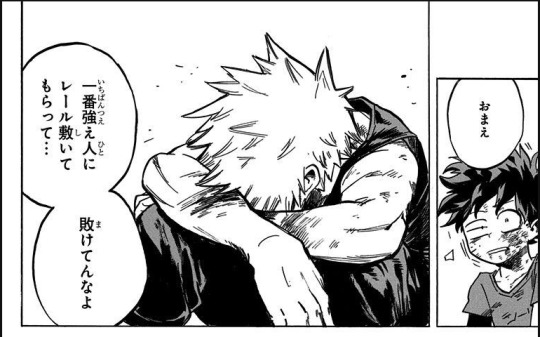
The second time is right after his apology in chapter 322. (Katsuki actually uses omae four times in a row in this scene.)
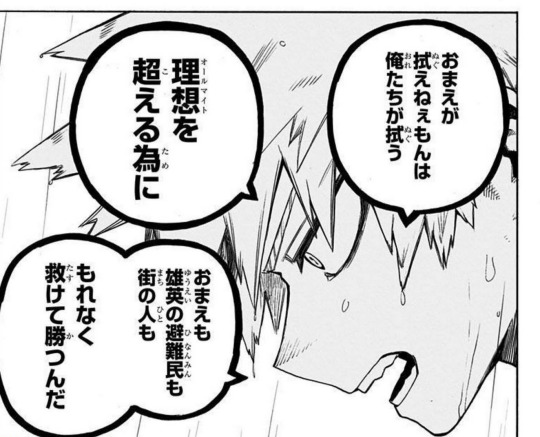
(We'll get to the third time later, just you wait.)
Why does Katsuki address Izuku differently in these scenes? To answer this, we’re gonna commit some language nerdery.
First, let’s be real about the fact that Japanese pronouns can be complicated. There are a ton of them. You learn the common uses—like you could say that, broadly, omae tends to be used by guys for their friends and romantic partners. But the reality is that in a high-context language like Japanese, pronouns can come across wildly differently depending on who uses it, to whom, with what tone, and in what context.
It is difficult to generalize real-life usage, so to be clear, I am talking about MHA as a piece of media. I could try to tell you that omae is rude but also friendly but also condescending but also comedic but also confrontational but also affectionate—and so on, but that wouldn’t help you understand what Katsuki’s omae to Izuku means and why it feels significant.
The thing is, Izuku and Katsuki can each say omae and mean completely different things, because their normal way of speaking tells us how to interpret their words.
When Izuku speaks, he is polite and considerate. He uses the boyish first-person pronoun boku (僕). In Japanese, avoiding second-person pronouns is the polite thing to do; you use the person’s surname and an appropriate suffix instead, and this is the tactic Izuku uses to address others. When he does say “you,” it is usually the familiar kimi (君) towards Katsuki.
We see Izuku use omae in only a few circumstances: he uses it towards himself during inner monologues when he is trying to figure out what to do or compel himself to act, and he uses it when he faces All For One.
Both of these involve what I think of as “tough talk”—Izuku talks tough to himself to push past his fears and be a hero. With AFO, he is talking to a villain, someone he has to defeat. From someone like Izuku who speaks with such politeness and humility, omae reads as aggressive and confrontational.
Katsuki, on the other hand, is always aggressive and confrontational. He uses the masculine, somewhat boastful first-person pronoun ore (俺) and the second-person pronoun temee (てめえ) towards just about everybody. Temee is an extremely rude, combative word; Japanese descriptions usually point out that it reads like fightin’ words—it’s what you’d call an opponent, someone you are confronting, challenging, or belittling. As mentioned, you’re supposed to avoid “you” words to be polite, so the fact that Katsuki whips out temee constantly and makes up insulting nicknames instead of using anybody’s real name is just like, damn, dude!
Unlike Izuku, Katsuki sounds like he is challenging everyone all the time. This means that, coming from him, omae actually seems gentler.
After Deku vs. Kacchan 2, he opens his sentence with omae, and Izuku looks startled by this.
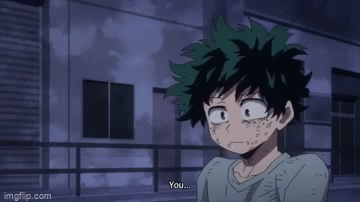
They just had a huge, emotional fistfight, and Katsuki… isn’t addressing him as an opponent, like he always has before. For once, he is addressing Izuku not as his enemy, but his equal.
This scene is the first time Katsuki properly grapples with the truth of their mutual weaknesses and comes to an understanding about it. It leaves him frustrated and unsure, but he walks away seeing himself and Izuku as being on the same side.
Because he takes All Might's words to heart: they are two halves of what makes a hero. They need to learn from each other and push each other to truly reach their best—as rivals, not enemies.
In chapter 322, Katsuki talks Izuku through how he felt about him all these years. He goes over all the things he's had to face to see how wrong he was, to see his own weakness and Izuku's strength. The whole time, he uses the "you" word he always has: temee.
But when it comes time to tell Izuku his true feelings, he calls Izuku by his given name, apologizes, and then right away he says this:
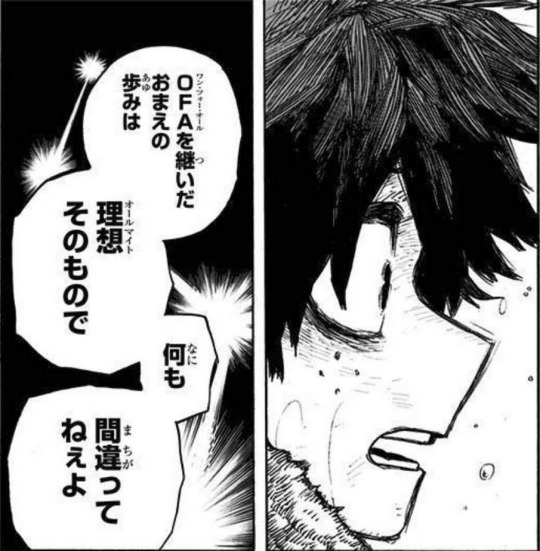
This is a direct call-back to the core question that Katsuki posed to Izuku during Deku vs. Kacchan 2: "Is my way of admiring All Might wrong?"
The second half to that question has always been, implicitly, "Does that mean yours is right?"
Here, Katsuki acknowledges Izuku fully as All Might's successor and affirms that Izuku's path is not wrong, using omae to tell him so. And then he uses it three more times to convince Izuku to come back with them and fight together, "because saving people is how we win."
To me, omae in this scene comes across with such softness. He's speaking with more humility than we've ever seen, both in what he's conveying and his word choice. (There is a whole other conversation to be had about Katsuki's word choice for "I'm sorry," but that is for a different time.)
This omae is not just a sign that he sees Izuku as his equal, it's expressing care for him. Katsuki sacrificed his life for Izuku, telling him, "Stop trying to win this on your own." He is trying so hard to make Izuku understand: Come back, I was wrong. Come back, I care about you.
Which brings us to the third time Katsuki uses omae: chapter 362.
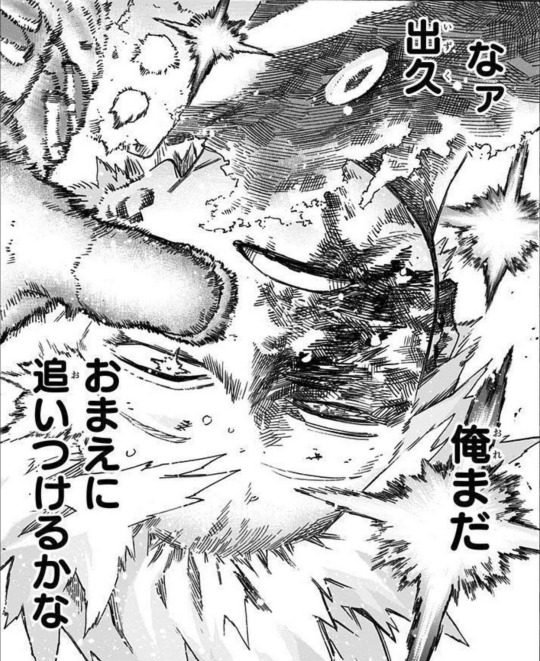
That's right, the infamous "Can I still catch up to you?" / "Can I still reach you?" line uses omae.
Here's the thing that's unique about this omae: it's in Katsuki's head. This is internal monologue; he isn't talking out loud to Izuku, he isn't trying to convey something to him face-to-face, he is just thinking about Izuku.
The word choice isn't for anyone else's benefit or any external purpose: this is just how Katsuki sees him.
I can't overstate how soft, vulnerable, and sincere this moment is for Katsuki. And what gets me about him thinking of Izuku as omae is, it makes me wonder, "How long has he thought of Izuku this way?"
When did Izuku stop being temee in his head?
Changing how you address someone is a big deal in Japanese. Whether it's a name or suffix change (Deku -> Izuku) or a pronoun change (temee -> omae), it represents a significant shift in the emotional dynamics of a relationship.
It crops up a lot in media as a dramatic moment of intimacy, sometimes even being a part of love confessions. This heightened drama is exactly what we see with Katsuki's apology when he calls him Izuku.
Katsuki addresses only Izuku with his given name and omae, and in the whole run of the series, he only uses omae in a few select instances. I would argue that this is really important, subtle character writing.
Looking at the scenes, at least to me, each omae reads as progressively more honest and intimate. Each time Katsuki uses it, he is reaching for Izuku. Each time, it means more.
#bkdk#bakudeku#mha spoilers#bnha spoilers#mha manga spoilers#bnha manga spoilers#bkdk apology#meta#mha 120#mha 322#mha 362
3K notes
·
View notes
Text
Xekstrin Arbitrary Writing Rules V2
1) Sentence variety and paragraph variety is important.
Quick and dirty fix: make sure the FIRST WORD of EVERY SENTENCE and EVERY PARAGRAPH doesn’t repeat too much. (Some repetition is inevitable as you will see later.)
“Huh???” I hear you say.
Ex:
Here’s my example text. Here is another sentence. Here once again is another line of text and even though it has a different length (good) it still starts with the same word and it repeats a bit too much.
Here we have a whole new paragraph, a completely new sentence with commas and everything. However it still starts with the same word. Here you might say, “but I’m repeating it on purpose!” Repeating on purpose is usually fine. Repeating unthinkingly means you aren’t diving into your edits deep enough.
Not a hard and fast rule by any means, but it starts you on the path to thinking more closely about your work down to the itty bitty details.
2) Adverbs are fine… depending on what you want to do.
“It’s not like she loved me or anything.” Sally laughed sadly.
This is a fine brief sentence that still tells us a lot! We can move on to other things while still keeping Sally in mind.
But! If you want to linger for whatever reason… give us some physical details. Tell us what things feel like and sound like. Describe what is happening.
“It’s not like she loved me or anything.” Sally choked when she laughed. Tears were streaming down the distraught lines of her face. Every inch of her was pale and cold to the touch.
Both sections can be equally sad, depending on the context. More words does not mean more emotion! It merely is a tool to let the reader sit with something a bit longer than they might otherwise. You can then try to control the speed a reader is introduced to things, and set up a “wham line” by forcing them to linger somewhere else a bit.
Not every line has to be a poem. Unless that’s your thing. Use your best judgment! Every writer is different and will want to write a scene differently.
3) Said is not dead
I see you, trying to replace every other “said” with “exclaimed” “shrieked”“hollered” “hooted” “ejaculated” or otherwise use another verb to replace “said” for no other reason than you are trying to avoid “said”.
At first this rule seems to go against rule number one, not to repeat words. But “said” (or “says”) is a special word.
Why?
“Said” is effectively invisible.
Readers tend to skim or skip it on instinct. When you use any word OTHER than “said”, however, you are forcing them to make a brief pause and absorb this. Are you wasting their time? Is it notable or otherwise important that this character is doing anything other than saying their words? Use your best judgement.
4) Shi shi shi shi shi shi shi… who is “she”?
We’ve all seen that chinese poem about Shi eating the lions, right?
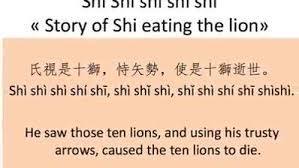
Writing a lesbian threesome feels a lot like this poem. When in doubt, even if you feel like it breaks rule number one, just use a character’s name rather than an epithet (“the long-haired girl” “the shorter girl”.)
This is less of a problem with het romance but still worth mentioning.
Epithets have their place, if you’re doing it with intention. If you want to talk about swift-footed Achilles, you know your story better than I do! Just don’t use epithets as a backup because you’re scared to repeat yourself. Readers can smell your fear.
5) Readers can smell your fear
Don’t force it. Don’t write for an imaginary audience that is out to punish you. Don’t write defensively in case someone misunderstands. We can smell your fear and it distracts from the story. Trust in your story!
6) Words mean things.
Flexing your vocabulary is sexy. Using big words incorrectly is the writing equivalent of slapping yourself in the face and smugly saying “see how strong I am?”
7) No one knows your story but you. This is both good and bad.
When you are writing, you are trying to show off what’s in your head. The reader does not, CANNOT, see what you see. Mind-reading is impossible.
It’s YOUR job to immerse them in your fantasy as completely as possible. Be clear, be vivid, and engage all the senses. They should know how your fantasy feels, how it looks, what emotions are wrapped up inside it, how it smells, and what it sounds like. What it means.
But also you’re not gonna please everybody so you should just do what you like anyway.
Bye!
185 notes
·
View notes
Text
writing tips masterpost
hello to my loyal tumblr followers... i am often asked to give writing advice but usually when people ask me this i'm nooooot completely sure what to say despite having a ton of advice to give. it's such a broad question when there are so many different things i can advise on, right? so i thought i'd make a sort of writing advice masterpost where i can compile the tips that i think people specifically in fandoms could benefit the most from hearing, OR that i wish someone had told me when i was still finding my footing as a writer.
hopefully this will be helpful to you. i am putting all of the advice under a read more since this is going to be a long one. let's roll!
✬ paragraph breaks are your friend
the fastest way to get me to stop reading a fic is if i click in and see that there are NO paragraphs made and the entire piece is in a huge block of text. no matter how good your work is, i just can't read it at that point. the giant paragraph makes me get lost, i can't focus on anything... it's a huge no.
the trick is you want your paragraphs to sort of act as a guide for your reader, taking them through the story, keeping them engaged. do not be afraid to do short paragraphs! i can understand wanting to shy away from one or two sentence paragraphs for fear of not having "enough substance" in your work, but the truth is, a thousand short paragraphs is ten times easier to read than a huge block of text.
realistically, you want to have a good amount of variety in your paragraph length. variety is key. readers will notice when your work gets formulaic, and some people will like that, but for others that can turn people away from your work. but don't force it! a paragraph should end at the end of a statement, or if the paragraph is getting too long then cut off the thought and continue in the next paragraph with a transitional phrase.
as a general rule of thumb, you want lines of dialogue by different speakers to be put in separate paragraphs. you also want to avoid doing huge chunks of narration or exposition in the same paragraph as you introduce a new speaker. just make a new paragraph! no big deal. i guarantee you your reader will be way more engaged and nobody is going to come at you for doing more rather than less.
✬ make sure the reader knows who is speaking and when
you don't have to end off every line of dialogue with "she said" and in fact i would really recommend you don't. but you ALWAYS need to have some kind of indication in the text as to who is speaking, otherwise the reader can get lost.
this doesn't necessarily mean that you always have to explicitly say who is saying what, though. if it is obvious in a scene who is saying something -- so for example, a scene where there are only two characters talking OR the dialogue has some kind of phrase, statement, etc that makes it obvious who the speaker is -- then in that case you can just let the dialogue speak for itself. sometimes in writing less can be more. you disrupt the flow of a scene if you start to exposit unnecessarily when the reader could reasonably work something out for themself.
✬ "said" is your friend too
related to the last piece of advice, here's another note: don't shy away from using the word "said".
don't overuse it, either. obviously, you don't want every single line to be "he says" "she says" back and forth, especially when they might be asking questions or shouting, in which case the word "said" probably isn't all that applicable at all. but it's a nice default. if you catch yourself busting out the thesaurus, my recommendation? quit it. just use said. it's not going to hurt you and the reader isn't going to mind.
but yeah, in the event that a character is raising their voice, whispering, inquiring -- there are tons of other words you can use in lieu of said and then an adverb. it's just context-dependent, and also, you don't really want to lean too far one way or another. like i said, variety is key. too much of the same breaks immersion.
✬ if you wouldn't say it yourself, probably don't use it in writing
another related tip. look, i get it. you want to spruce up your writing with synonyms. but the fact of the matter is that a lot of these words that "mean the same thing" on paper actually have wildly differing connotations and if you don't understand what those are you're going to look kind of silly whipping out a word you just found off the internet. we can usually tell, too.
your vocabulary will naturally grow and expand as you continue to read and learn. you don't have to try and force it to seem smarter in your writing. people who can write compelling prose and dialogue without throwing in fancy words they barely understand look a lot more intelligent than people who have a thesaurus at the ready 24/7.
✬ if there's a simpler way to say it, take it
this one can be sort of style-dependent, so if it's not your cup of tea then feel free to take or leave this tip, but in my opinion, taking a whole seven-line paragraph to describe a simple action wastes both your and the readers' time.
how many times have you read a fic where the main characters are having a conversation with these long rambling paragraphs between lines of dialogue? sometimes this makes sense! if you were writing a death note fic it would absolutely make sense for light or L to be pausing every few seconds to carefully analyse their opponent's move... but that's not always the case. sometimes characters are just making small talk.
i'm not saying you can't show off. you should show off where applicable. but there's a time and place. sometimes a scene benefits more from you taking the easy way to describe something and moving on. flowery language is great, but if you're meandering too much the reader will lose interest and attention.
✬ a metaphor is useless if nobody knows what it means
writing is subjective and highly personal. write for yourself first and foremost, and use the metaphors that feel right to you -- but the best metaphorical pieces, to me, are the ones that people can understand and identify with.
you've read a story like that, haven't you? with a reoccurring theme or motif that comes back into play at the end in a way that makes you feel so satisfied and complete? THAT'S what you aim for with literary devices like that. if you write a story that nobody can understand, with metaphors that just don't make any sense -- then you haven't really successfully told a good story, have you?
i understand wanting to have a magnum opus. i think it's easy to fall into the "misunderstood writer" mindset where you want your pieces to be so magnificent that only the likeminded will get it -- but writing is a form of communication. metaphor is just another means with which we can illustrate how we feel. you WANT your readers to understand what you're doing with the metaphors, you WANT the people who step away from your story to know what you were trying to say. you don't have to be obvious, just make it good. make it something that can be reasonably drawn from the text.
at the end of the day flowery language is just flowery language. that doesn't actually make your story good.
✬ grammar intermission
(.) period/full stop: used at the end of sentences. oftentimes not used at the end of sentences in dialogue, because lines of dialogue are considered a fragment of a larger sentence. use a period/full stop at the end of a line of dialogue if the dialogue is followed up by another complete sentence. example:
"i just went to the store," he said, scratching his head.
"i just went to the store." he scratched his head.
(,) comma: used in the middle or to separate different clauses (parts/sections) of sentences. used for incomplete clauses, AKA sections of the sentence that could not function as individual sentences. also used to indicate a slight pause. example:
she reached for the ripest banana, plucking it from the bunch.
a comma can also be replaced by a conjunction like "and" or "but". example:
she reached for the ripest banana and plucked it from the bunch.
(;) semi colon: used to separate different complete clauses in sentences, AKA sections of the sentence that are related but COULD function individually as their own sentences. example:
he sighed as he looked out the window; it had been so long since he stepped outside.
not to be confused with
(:) colon: used at the end of a line that leads into or introduces another line. example:
his fingers drummed restlessly against the window sill. it was finally happening: he was finally leaving this place.
(-) hyphen: used to connect compound words like three-years-old or hyphenated surnames like jones-smith.
(–) en dash: used to indicate ranges of time or distance, like 3–4 hours.
(—) em dash: a girl's best friend. slash j. but an em dash is used to indicate a few different things: an abrupt end to a thought or sentence, a "cut-in" where you interject something tangentially or unrelated before returning to the original thought, or a diversion in the sentence/thought. examples:
"no, listen, you don't understand—"
he scowled—an ugly look on his usually handsome features—and told her to be quiet.
it's not like she had wanted it to go that way—but when had it ever mattered what she wanted?
(()) parentheses: used to add additional context, information, or a semi-unrelated thought that would break the flow of an ongoing sentence without completely taking the reader out. example:
"no, i'm sorry. i just forgot to call you this morning," he said, looking away. (in truth, he'd sat by the phone for fifteen minutes trying to psyche himself into it, but hadn't been able to muster the courage.)
✬ show don't tell, and tell don't show
show don't tell is one of the classic pieces of writing advice that i do, often, think is correct -- but it's a little more nuanced than just never telling your readers what a character is thinking. you want the work to speak for itself without you implanting messages or themes into the reader's brain. at the same time though you don't want them to be doing too much work because it breaks immersion.
this ties into what i was saying above about simpler being better sometimes. you want to be concise especially in scenes that might call for it. a fight scene should be quick and snappy. no need to dig into the physical sensation of being enraged -- just say the character is pissed! but if a character is having a meltdown or panicking, you can get SO much more out of describing how that feels than just outright saying it.
✬ remember your perspective
another huge thing with show don't tell is that you don't want your character to be able to objectively say what everyone else is thinking and feeling -- unless that makes sense for them within the context of the story. really dig into it. DOES the character have a reason to know what their opponents, friends, etc are thinking? how well do they know the other characters? how attentive are they to the emotions of those around them?
it's better to focus on descriptions than labels in that case. say what face a character is making, describe their body language or tone. your character can have impressions, just make it clear that those ARE their impressions. and let your character be wrong! they do not have to be a completely objective source of information.
✬ when it comes to representation, if you aren't confident you can do it well, don't do it at all
i'm one of those people who's kind of of the opinion that white or cishet or otherwise systemically advantaged people have no place being the loudest voices in conversations about representation, least of all AS the representatives. if you are someone with systemic privilege and you choose to portray someone who is oppressed -- that's not necessarily a bad thing. but you need to be willing to do your research and have a sensitivity reader, and you have to be ready for people to say you did it wrong.
not much else to be said about that. your voice on the matter isn't actually all that important. there are people from the demographics involved who DO have stories to tell about themselves that will be MUCH more valuable than your perception of them, so it's honestly better to just let them tell it. that's how i feel.
✬ don't break the rules unless you know how to follow them. in other words, your rebellion should be obvious
a lot of times i see people breaking grammar or other rules and citing "stylistic" choices as their reasons why. which is all good and well, to an extent -- but you want it to be very clear that you ARE breaking the rules on purpose in a way that adds to the artistic merit of your piece.
if you don't know the rules, then it really just comes across like messy work. you both have to know how to apply the rules, and also how to break them in a stylistically significant way. if it doesn't make sense for the rules to be broken, if it says nothing... it's honestly better to just follow them. that's my take.
✬ don't be scared of names and pronouns
i said before that you want variety in your work, and that is very very true -- but it's also true that certain words like names, pronouns, etc will sort of blend into the background in writing. people don't notice them. that means if you're using a name or pronoun a lot in a scene to make it clear who exactly is being referred to...
hey. look into my eyes. breathe. it's okay. you do not have to resort to highlighting arbitrary characteristics of the characters. i know. just breathe. it's okay. use their names. they have them for a reason. it's all good.
this isn't to say that you SHOULDN'T do that, just do it when it makes sense to. if height is something the characters are noticing then use "the shorter boy". if age is relevant, eye colour, hair colour, whatever -- go ahead and use them. but don't be excessive with it. i should not be having to read the bluenette more than i'm reading shuichi's actual goddamn name.
✬ read
this is the huge one. reading other works informs your writing. it teaches you skills and tricks you can use. it helps expand your dialogue and your world view. it might even highlight to you things you do too much of in your own writing. read, all the time, whenever you can. it doesn't have to be books. it can be fanfic, articles, whatever -- just keep reading, because you will be passively absorbing knowledge during that time and it'll help you grow as a writer.
✬ practice
BOOOOOO TOMATO TOMATO TOMATO! SHE SAID THE THING SHE SAID IT!
but listen, it's literally just true. i write almost every day for at least a couple of hours and i have been on a trend of consistent growth for the past five years. go read my fics from 2019 if you don't believe me. i've grown fast and i've grown constantly. you just DO grow through constant practice, even if it doesn't always seem that way.
not only that, but you start to build confidence too. writing a lot helps develop those muscles to a point where you start to realise that you ARE that good and you DO have that dawg in you. or whatever. you just have to keep at it. you're not going to magically improve thinking for six months about how you want to be a better writer without practicing anything about it.
✬ yeah, betas are good
you want to have a good editor. i know that that can feel like having someone ELSE be the reason your piece is good, but that's genuinely not it. a beta reader is a second pair of eyes on your work, someone who can tell you about the issues and mistakes you're missing. they'll tell you when something doesn't make sense. they'll point out your punctuation errors. you don't NEED to have a good editor for every crummy little oneshot... but it's good to have one.
✬ numbers are fine and all but don't compare yourself to other people
i think almost everyone in some kind of creative pursuit wants to get some kind of acknowledgement for it. we want to be the best we can be, and it can be discouraging to receive utterly no validation along the way! i get it!!
just don't get caught up in crunching the numbers. you are not as good as your fanbase is. you alone know your skillset and you absolutely should not say "well this other writer got THIS much attention" because that'll just wear you down. it really will. external validation will only keep you going for so long, and you'll always end up needing more. you HAVE to build your own personal confidence first or you'll crash and burn.
✬ read your writing out loud
there is no quicker way to see if something is wonky in your prose than reading it out loud and seeing if it makes sense verbally. i highly recommend this to anybody who struggles with sentence flow. it's a good one.
✬ yippee hooray!
🥰 and that's what i've got for now. thank you if you made it this far, please take all these tips as you will, it is all subjective of course, these are just the tips that help Me the most when i sit down to write something.
please feel free to ask me for additional advice (on specific topics if you could!) at any time, i love encouraging new writers and i am passionate about writing so i will gladly offer support in any way i can, including beta reading works for anybody who might need that.
take care now 💖
267 notes
·
View notes
Text
MPW Ep 5 Subtitle Corrections
Masterlist: EP 1 || EP 2 || EP 3 || EP 4
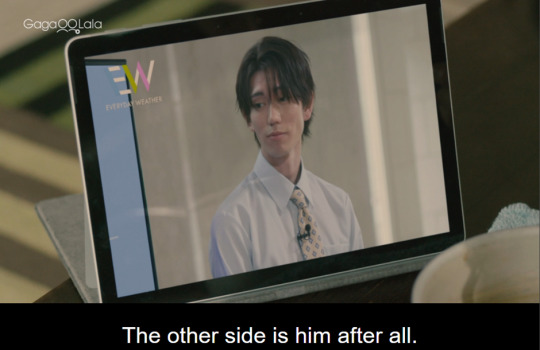
Y: 釣り合うわけないじゃん
Y: 相手はよりによって これだぞ これ
Y: There's no way (I) can match up (to him)
Y: To this (person), of all people, this!
Ep 5 is about Yoh struggling with his desire to "match up" to Segasaki, and the objective difference that he sees between the two of them. It's different from Ep 2's struggle - which arose chiefly because he felt insecure about where he stood with Segasaki. This time, Yoh's struggle is predominantly with himself - because now he has to face up to his worst fear confirmed - that maybe he really is incompetent. And this time, he has to do it without the aid of alcohol too.
I've seen a lot of people talk about how Segasaki shows Yoh his love in every way but in words, and that that's the reason for their miscommunication - but that's not true. He may not use the word "love" or "like", but culturally these words are not often used anyway. What Segasaki does say however, multiple times throughout the show in fact but most clearly in this episode, is essentially "I like it when you depend on me". It's as direct a reassurance as you can get to the fear of being hated because of his perceived incompetence - but that's just the thing - Yoh's perception is skewed by his self-judgement. So, it's not that Segasaki can't use his words - the problem is that Yoh isn't ready to listen yet.
Despite this, Yoh's confidence in his relationship with Segasaki is growing every episode. He might not realize this consciously, but it's right after Segasaki comforts and cares for Yoh at his lowest, that Yoh also drops to what is arguably the most casual speech level he's ever gotten with Segasaki (thus far) - and in response, so does Segasaki.
So, same translation disclaimer applies, Ep 5, let's go! (no twitter space for EP 5 probably because of the fan meets).
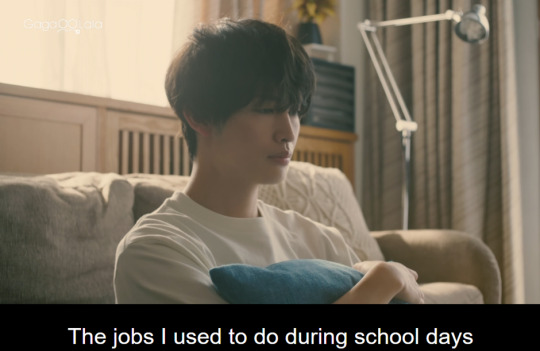
Y: 学生時代から不定期でもらってた単発の仕事も途切れて
Y: 完全無職だ
Y: あ、せめて、家事ぐらいはちゃんとやらないと
Y: Now that the one-off jobs I've been receiving on an irregular basis since I was a student have been cut off
Y: I'm completely jobless
Y: Ah! At the very least, I have to do something as small as the housework properly.
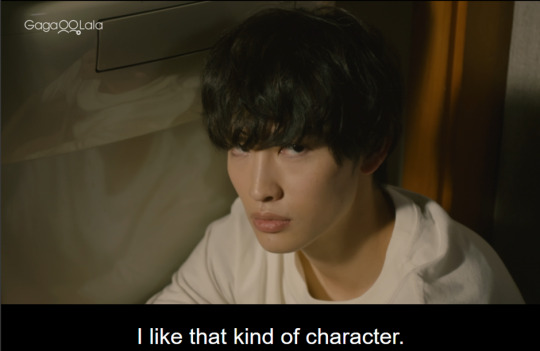
Y: だって そういうのがすきなんだよ、俺は
Y: But, actually, that's what I like
Yoh's explicit use of the personal pronoun "I" here again emphasizes that this is his own opinion. The way this sentence is phrased also gives the impression that Yoh feels a little aggrieved at the whole "your male characters are irritating to male readers because they're too perfect" explanation his editor gave him.
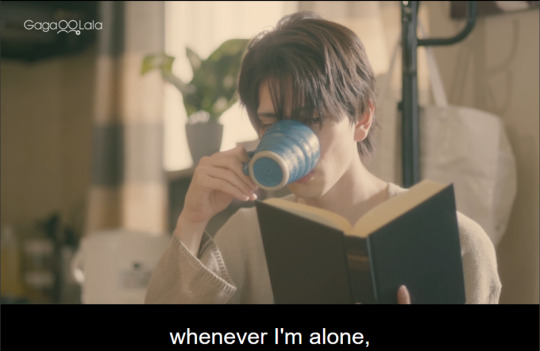
Y: *そりゃ、ほっといたら描いちゃうよ
Y: **お前のせいだ
Y: お前みたいなのが ***近くにいるから
Y: バーカ
Y: *Well I mean, if I'm left to my own devices then I'll end up drawing (him)
Y: It's all your** fault
Y: It's because someone like you, is (always) around*** me
Y: I~diot.
*The "aggrieved" feeling is even stronger in this sentence - Yoh is basically saying that he doesn't set out to draw the characters that way - it just sort of happens, and well it's not his fault, because as long as no one (including he himself) is paying attention to what he's drawing, well then, the characters just turn out that way.
** This is the first time that Yoh has referred to Segasaki using the informal pronoun "お前 (omae)" for "you". Depending on the context, it could be considered a rude pronoun, but is mostly just seen as a marker of masculine speech, and thus leans more towards being simply "impolite". It's the same pronoun that Segasaki uses when he speaks to Yoh - but Yoh usually uses the slightly more polite "あんた(anta)" instead, both in his head as well as when he speaks aloud. The switch here emphasizes Yoh's accusation, that this is all Segasaki's fault.
***the phrase here is often used to say that someone is "by your side" or "here for you" and doesn't only refer to physical distance. So, although he's using "omae" and "blaming" Segasaki for his characters turning out looking perfect, these 4 lines actually still sound pretty intimate. Together with how he drags out the word "idiot", this is very clearly Yoh's amae, similar to what we saw in Ep 4. I... will probably write a post about amae as well, because it's so important to their relationship.
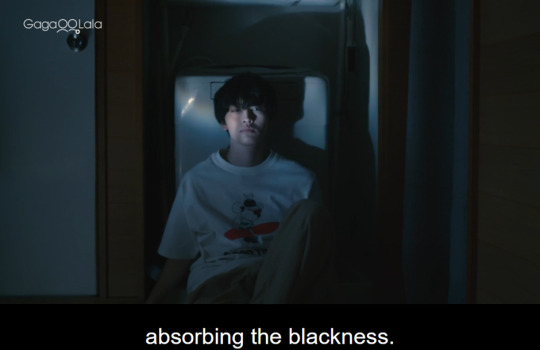
Y: 洋服を着たまま海に溺れるように
Y: 暗いものが染み込んで
Y: 黒いものを吸い込んで
Y: ブヨブヨになった体はずっしりと
Y: 重く 重く。。。
Y: It feels as if I'm drowning in the ocean whilst fully dressed
Y: The darkness seeping into (me)
Y: The blackness pouring into (my mouth)
Y: My body, now swollen, sinks heavily down
Y: So heavy. So heavy.
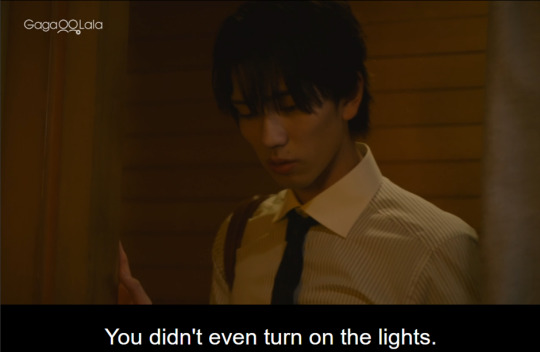
S: なんだ いるじゃねぇか
S: 電気も付けねぇで 何やっ
S: Oh so you are here
S: Not even switching on the lights, what were-
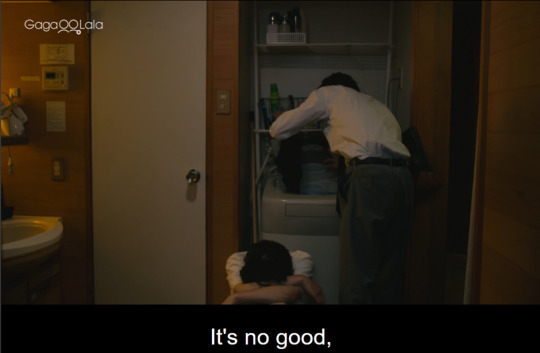
S: *あちゃ~ これやり直しだな
S: *Ahchaa... This needs to be redone then..
*This is just a sound that you make similar to "oh man..." so I'm not sure why it was translated so forcefully as "it's no good"😅 This sentence is another example of soliloquy, or talking to oneself aloud, that is common in Japanese.
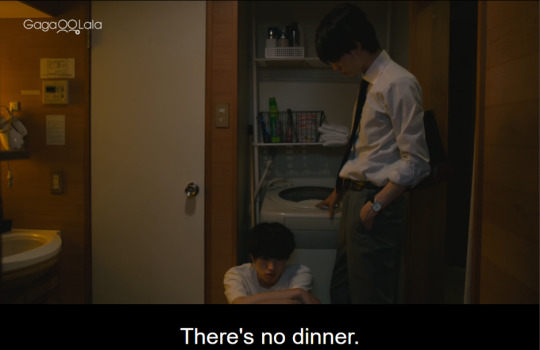
Y: ご飯、ない
Y: ごめんなさい
Y: すぐ準備する
S: *しょうがねぇなぁ ほら立て
S: 行くぞ
Y: Food... there isn't any
Y: I'm sorry
Y: I'll make it soon
S: *What do I do with you... come on stand up
S: We're going
Yoh is really down here because he loses practically all his words. His first sentence is literally "food, none", and when he says I'm sorry he uses the casual (but full) version "gomen nasai" instead of "suimasen" like he usually does. It makes him sound a lot younger than usual, and overall just adds to the kicked-puppy vibe really well.
*しょうがねぇなぁ (shouganee naa) - this is a common phrase that literally translates to "there is no way (to deal with this)" or more commonly "(this situation) can't be helped". It's used to express a sort of acceptance, like in a "oh well, it can't be helped, so don't feel too bad" or "well there's no way this could've been avoided, so let's just get on with it" sorta way. Here, the way Segasaki adds "naa" at the end with a rising tone, actually makes it sound a little indulgent - like when you find your puppy made a mess but it's too cute for you to feel upset and you just love it more. (Also, this is a really common way to show affection between characters in dramas/anime - when one character is down in the dumps, another will be like "well what am I going to do with an idiot like you, I guess I have to help, right?")
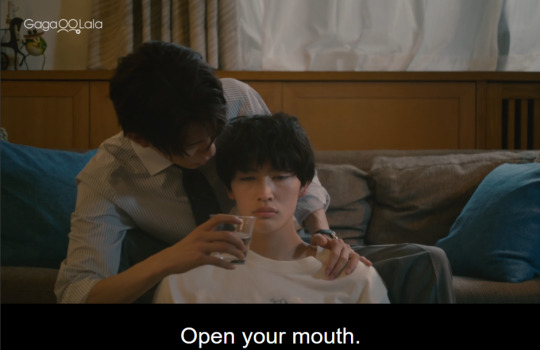
S: 葉 とりあえず 口開けろ
S: Yoh. In any case, open your mouth first
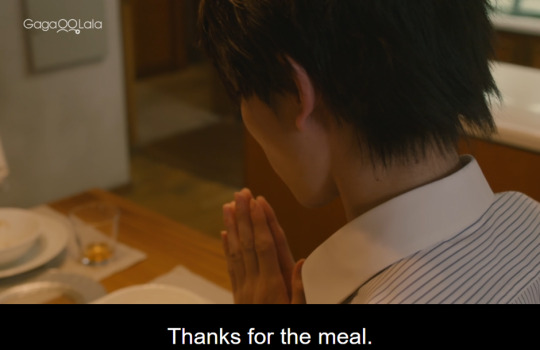
S: ごちそうさまでした (gochisousama deshita)
S: Thank you for the food
This is a standard phrase said at the end of a meal (it's counterpart is "itadakimasu - I gratefully partake" said at the beginning). It expresses gratitude to everyone involved in making the meal possible - from the farmers who grew the vegetables to the person who cooked the meal, and yes, even to the animals themselves. Usually, you would say this to the person who made the meal, or the one treating you to it, but it's Segasaki here who leads the saying of this phrase. This isn't weird at all, given the broad meaning of the word, but it is reminiscent of what a parent would do at home, or a teacher would do in school (Japanese teachers eat with their students in class).
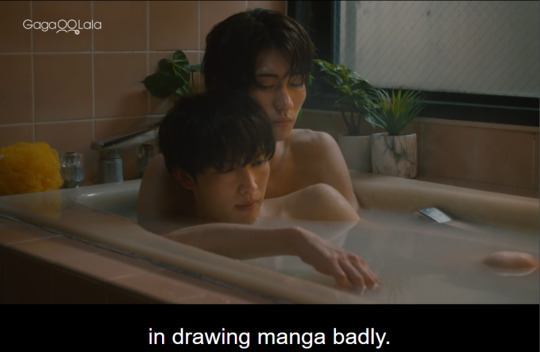
S: なんか落ち込んでんの?
Y: 漫画が とてもだめです*
S: You seem a little down about something?
Y: My manga is... really bad.*
*desu form is back, to give emphasis to this sentence. That said - and I'm really not trying to belittle Yoh here - but similar to the "food, none" phrase earlier, this sentence is just so short and simple that it just makes him sound, well, young. Imagine asking someone "you don't seem to like that person?", and they look at you all serious and say "they're a bad person" - it just sounds unexpectedly young and innocent, and the whole "desu" at the end just tops off the kicked puppy vibes for real. It's why Segasaki snorts a little and smiles.
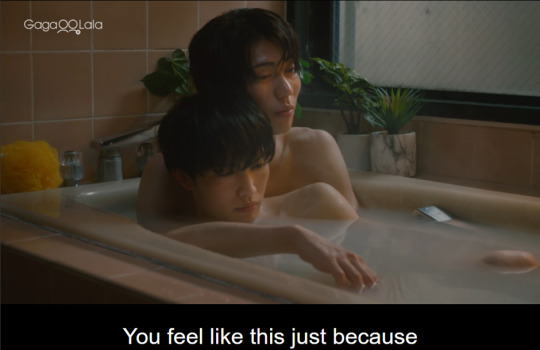
S: お前漫画がだめだと こうなんの?
S: えっ そんだけ?
Y: うん
S: ふーん
Y: そんだけってなんだよ
Y: こっちは 今にも 死にそうな気分なのに
S: So when your manga is bad you become like this?
S: Eh? That's all?
Y: Mm.
S: Hmm~
Y: What do you mean "that's all?"
Y: When here I am feeling like I'm about to die soon
In case you were wondering, "that's all?" in Japanese sounds exactly as it does in English, so no blaming Yoh here for being all 😟 about it.
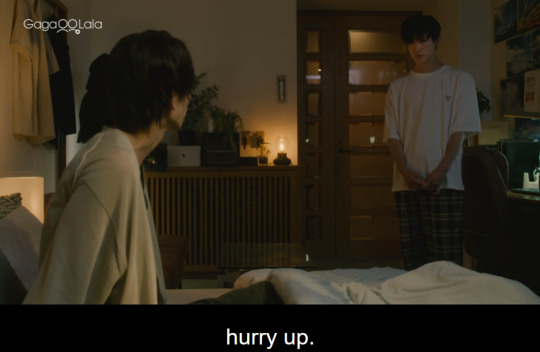
S: ほら* 早く来い
S: Now, come here, quickly.
*ほら (hora) - I last highlighted this word in Ep 3, but Segasaki actually uses it a lot more that just these 2 instances (not least because Yoh's always avoiding him). It's simply a word used to get the listener's attention, like, "look here" or "now" or "see" or "come on" etc.
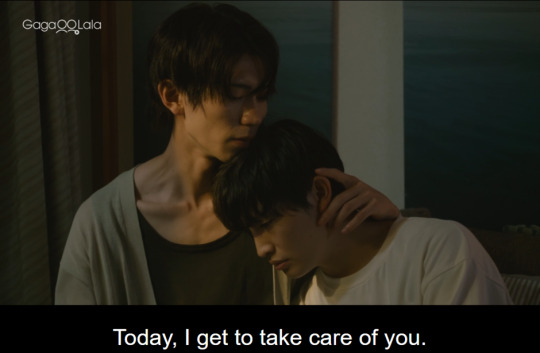
S: 今日はお前がされるがまま*で気分よかったわ
S: もっと落ち込め
S: Today you did exactly as you were told, so I felt really good
S: Be dejected more often
*されるがまま - this phrase means to passively go along with whatever the other person says or does to you, without any resistance (it can also refer to letting nature take its course). It's mostly used to describe a negative situation since it usually implies that the person has no free will of their own, but can also be fairly neutral as in "I followed the waiter's recommendations exactly". So, it's quite amusing that in these 2 sentences, negative sounding words are actually meant to be really sweet (just like how Yoh's "I hate you" sounds eh?).
Personally, I also appreciate how this is a callback to Yoh's monologue in Ep 3, when he talks about noticing the way Segasaki looks just that little bit happier when Yoh listens to him. Here, Segasaki confirms it for Yoh (and us), reinforcing to Yoh that he really doesn't mind Yoh depending on him one bit.
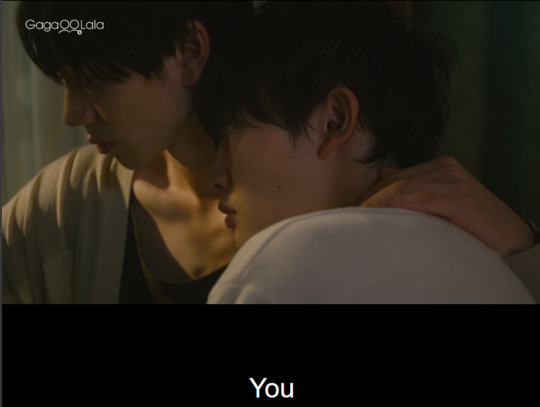
Y: こんなの本物の恋人同士みたいだ
Y: あんた* まるで本当に 俺のこと好きみたいじゃん
Y: Like this... it feels like we're a real live couple
Y: You*... it's as if you really do like me
*We're back to Yoh's usual "anta" here for "you", instead of the "omae" he used earlier.
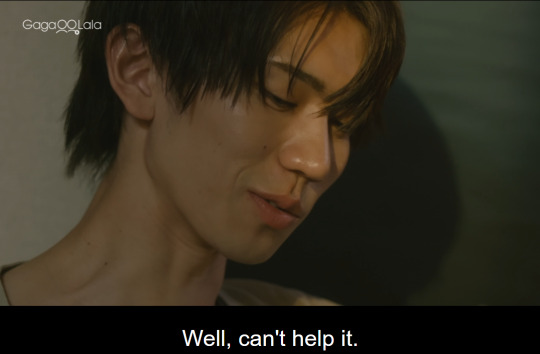
S: しょうがねぇなぁ
S: What do I do with you
This is the same phrase as earlier, when Segasaki found Yoh by the laundry machine.

Oh, the moon is beautiful isn't it? 🤭🤭
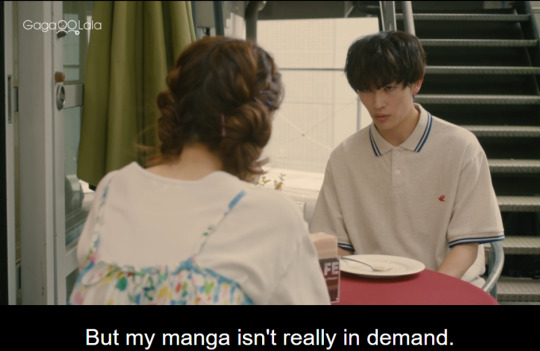
Y: だって 俺の漫画は世間に求められてないわけですし
Y: But, it seems like the world doesn't want my manga...
The phrase "the world wants/doesn't want" is commonly used when talking about finding one's place in the world/society, and young adults often say this when trying to figure their life out. So yes, not so uncommon a phrase that this sentence sounds ridiculous, but it definitely does sound a little dramatic. Hence Man-san's response.
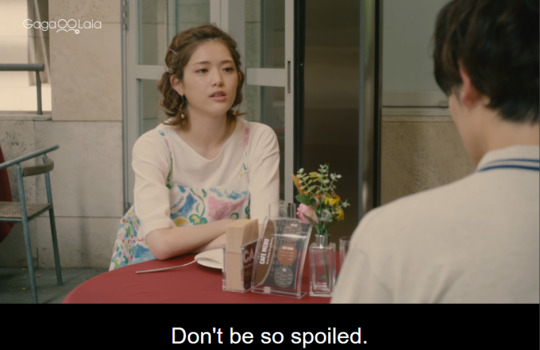
M: *甘ったれんな 思い上がんな
M: Don't be so *spoiled. Don't think so highly of yourself.
*The is the same word, amae, that Man-san used in Ep 4 when she said Yoh was being affectionate with Segasaki. This is another meaning of amae, and it is used in a negative way here, which sort of shows you the complexity of this concept. Underlying it is the message that it's okay to be dependent on your loved ones for your emotional needs, but you still need to take responsibility for your own life.
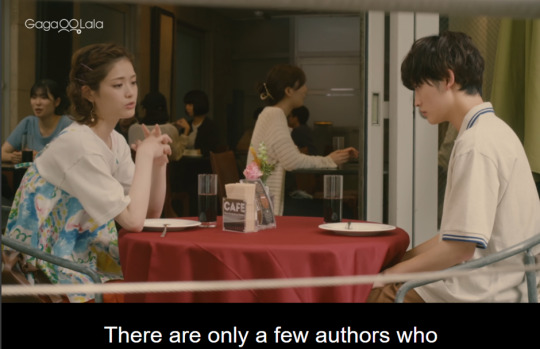
M: 衣食住の保障された環境でのんびり描いてて
M: 一回仕事が途切れたぐらいでうじうじ言ってんのか
M: 本気で気に食わない
Y: 万さん オーバーキルです
M: Being able to draw freely without having to worry about your clothes, food or lodging
M: and yet acting all wishy-washy the moment something as small as getting your work cut off just once happens
M: I really can't stand that
Y: Man-san, that's overkill
The term Man-san uses to describe Yoh's current living arrangement is the same term that Segasaki used in his not-proposal, so this suggests that by now Yoh has told her everything about how they got together (and I love that Man-san totally does not judge).
It's not explicitly talked about in the show, but despite their similar status as Segasaki Otakus, Man-san does often come across as something like a mentor figure to Yoh, or at least someone senior to him in the Manga world. For one, she speaks very casually to him (for a lady, she sounds as rough as Segasaki tbh 😅), even for someone from the Kansai region, and she often gives him advice. Yoh usually speaks to her informally, but in this whole conversation he does shift up to the desu/masu form often, in response to her scolding him, because she's really going at it (even after taking into account her usual speech pattern😅) and well, he's smarting a little at the moment 😂
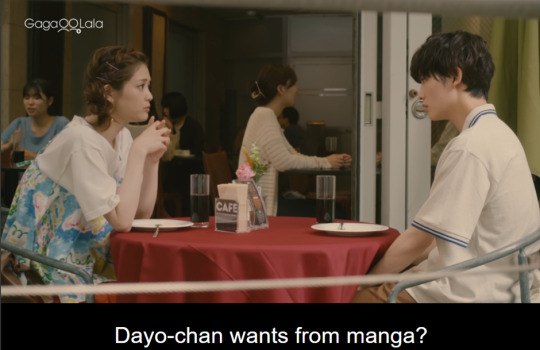
M: 世間がどうとかじゃなくて ダヨちゃんはどうしたいの?
Y: え?
M: ダヨちゃんにとって 漫画って そういうもんだったの?
M: もうちょっと落ち着いて 考えな
M: Rather than thinking about what the world wants, what do you, Dayo-chan, want to do?
Y: Huh?
M: Is that all that manga is to you, Dayo-chan?
M: Calm down a little more and think about it yea?
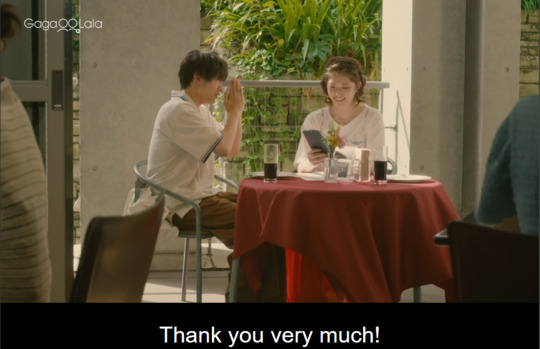
Y: かたじけのうございます
Y: I am indebted to you!
This is a very very archaic way to say thank you, think like samurai-level archaic. These two definitely live in the world of manga 😂😂
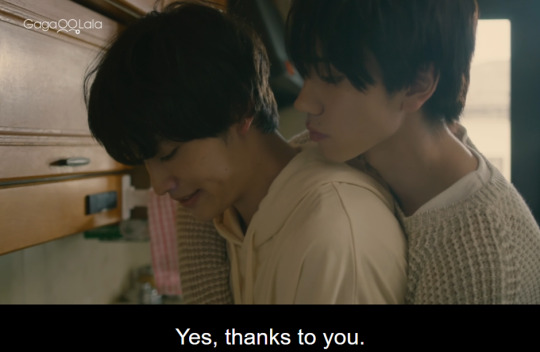
S: もう体調は戻ったのか?
Y: はい おかげさまで*
S: また 崩してくれても**いいんだぞ
Y: ええ?
S: Have you recovered now?
Y: Yes, thanks to you*
S: It's okay to feel down again for me** too you know
Y: Eh??
*Okagesamade - standard phrase you use when someone asks after your health, or when you want to express gratitude for someone else's role in your success/improvement/recovery etc
** 崩してくれて (kuzushite kurete)" - adding "kurete" at the end like this literally means that Yoh does the action of feeling down for Segasaki, rather than just "it's okay to feel down again", which is why Yoh responds in such a surprised manner. As he did before, Segasaki takes what normally is a bad thing and talks about it like it's something good instead. It's his way of emphasizing that Yoh depending on him isn't an inconvenience, in fact, it's something that Segasaki is happy to be on the receiving end of.
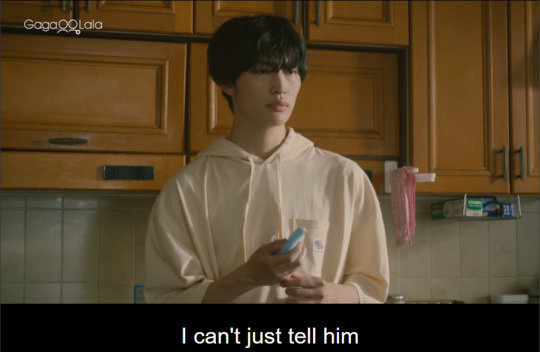
Y: これから自分たちをモデルにした漫画を描きに行きますなんて言えないし
Y: そもそも、万さんのところにしばらく通うことを許してくれるかどうか。。。
Y: なんとか説得しないと
Y: It's not like I can just say "from now on I will be going (out) to draw a manga based on us!" or something like that and...
Y: In the first place, (I don't know) whether or not he'll allow me to go to Man-san's place regularly during this period...
Y: I have to find some way convince him.
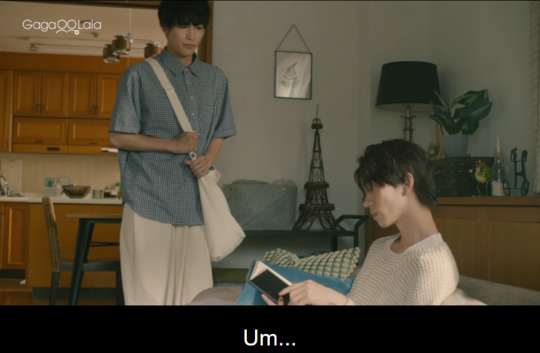
Argument breakdown time, things get intense~~
Y: あの。。。
S: ん?
Y: 今日 編集部で打ち合わせをすることになった*
Y: Um...
S: Hm?
Y: Today, I have a meeting at the editorial department*
*Literally, "It has been decided that today (I) will be having a meeting at the editorial department" - this might sound like an indirect way to say "I am going to a meeting" but it's pretty par for the course when speaking politely. Except, Yoh doesn't use the polite form here like he did in Ep 4, nor does he phrase this sentence as an explanation that he's going to follow up on. Nope, by Yoh's usual standards, this is An Announcement, so it's no wonder Segasaki is immediately suspicious.
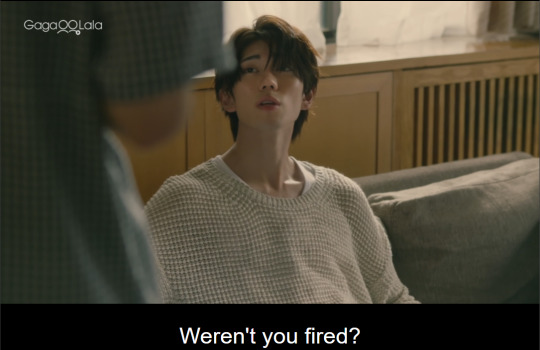
S: はあ? 仕事切られたんじゃねえのかよ?
Y: いや そ、その。。。新しいやつ
Y: しばらく 忙しくて
Y: 場合によっては編集部に泊まりもあるかも
S: 昨日の今日で そんなことあるか?
Y: たまたま連絡がきたんだよね
S: お前 なんか 俺に嘘ついてない?
Y: う、嘘じゃない
S: いや おかしいだろ 泊りって
S: お前 まさか変な仕事じゃねぇだろうな?
Y: そんなこと。。。ないよ!
S: Haa? Didn't they stop giving you work?
[じゃねえのかよ - Segasaki slurs the end vowel here, and adds the end particle "かよ(ka yo)" at the end, which is a rough way to express doubt or surprise, and usually implies some irritation. This, combined with Segasaki's trademark annoyed "haa?" results immediately in a rather flustered Yoh, who stutters a little on the next sentence]
Y: No, it-it's... this is a new one.
Y: For a while, I'm going to be busy and
Y: Depending on the situation, staying overnight at the editorial department... might... be... necessary...
[No end particles here - this is still a statement, and would sound stronger if not for the fact that he's hesistating so much]
S: And all that just happens today, on this day, just one day after yesterday?
Y: ...It just so happened that they contacted me, you see...
S: You... are lying to me, aren't you?
Y: I-it's not a lie!
S: No, it's weird isn't it, to stay overnight?
S: You - don't tell me - you aren't doing some kind of shady job are you?
Y: There's nothing... of that sort!
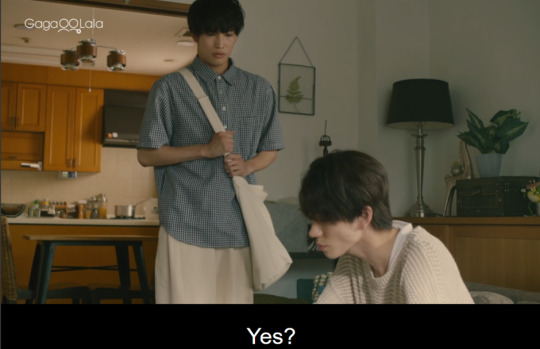
S: 葉
Y: はい
S: Yoh
Y: Yes (hai)?
Yoh's been making a valiant effort to stick to his story throughout this whole conversation but his tone changes completely and he pretty much gives up once Segasaki points out he's lying. In response - and this is not easy to hear but if you want to, go back to about 19:56 or 19:57 of this episode - do you hear Segasaki's small "tsk", after his sigh and before he says Yoh's name? Clicking your tongue, or "tsk-ing" someone is a very very rude way to express frustration or anger in Japan. We're talking get-into-drunk-fights level of rude, if you do it to a stranger. Amongst close friends and family, you're more likely to draw shock first, since it shows the depth of your anger, but they might still get pissed with you afterward. Here at least, Yoh can tell both from the tsk and Segasaki's tone of voice, that he is Not Happy, so he answers Segasaki with a proper "hai" here too.

S: ちょっとここ座れ*
Y: はい
S: 早く
S: Come sit here*
Y: Yes
S: Be quick.
*Slurred "r" on the word "suware" - sit makes this sound very very rough. Segasaki doesn't normally do this, so again, this is him angry, and he's going to slur his r's quite a bit more.
S: お前さ 自分の立場わかってんの?
S: 分かってねぇだろ 分かってねぇから 泊りで仕事とか言い出すんだろうが
Y: え~っとだから 遊びに行くわけじゃないし。。。
S: そうじゃねぇだろ
S: ああ~もう
S: 金か?なんか欲しいもんがあるなら買ってやる
Y: 違くて 少しはさ。。。
Y: 自分が稼がないとって
S: 必要ない なんで分かんねぇかな
S: お前は稼がなくていいんだよ
S: Listen, you - do you even understand what position you're in?
S: You don't do you? You don't understand and that's why you can just say things like you'll stay out to work overnight.
[This is harsh. Not only is the speech rough, he's still slurring some of his "r"s here, and the ending particle だろうが emphasizes the forcefulness of this statement and Segasaki's frustration - and you can see the effect it has on Yoh.]
Y: Umm well... it's not like I'm going for fun or something...
[This is indignant, but also nervous - Yoh's speaking a lot faster than usual, and he has to drag the filler words at the beginning out before he can figure out what to say.]
S: That's not what I'm talking about is it!
[slurred r again]
S: Argh I swear -
S: Is it money? If there's something you want then I'll buy it for you
[more slurred "r"s]
Y: That's not it! Even just a little -
[This is the first time Yoh uses the end particle "さ (sa)", and just like Segasaki, he's using it to draw attention to what he's saying, essentially the equivalent of "listen!". This whole line isn't rude, but it is direct and it's probably the most forceful Yoh has gotten with Segasaki so far, even compared to their argument in Ep 2 - Yoh might have physically pushed Segasaki then, but he mostly just sounded hurt. Here, he's very tense, but he's cut off by Segasaki biting his ear.]
Y: - I should earn some money myself (at least, I thought so)
[This is more like how Yoh usually voices his opinion - by "hedging" his sentences a little with "I think" and so on to sound less direct - though he's still using truncated forms here, so he's not quite back to his usual level yet]
S: There's no need to. [To self:] Why don't you understand?
S: It's fine even if you don't earn anything.
[Similarly, Segasaki softens this sentence just a tiny bit by tacking on a よ(yo) at the end]
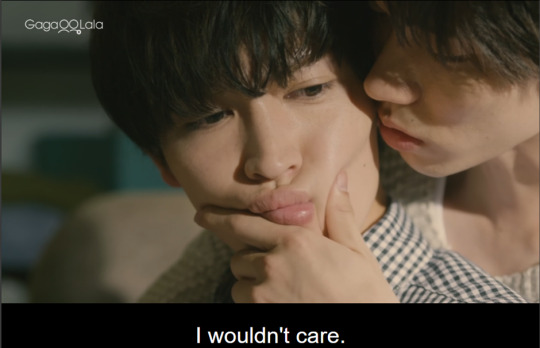
Y: でも!
S: あのな 俺はお前に漫画の仕事がなくなろうがどうでもいいんだ
Y: But!
S: Listen to me. I don't care at all whether you lose your manga work or not.
[To be fair to Yoh, the phrase "どうでもいいんだ" literally means "it's fine either way" but it tends to feel like "I don't care because it doesn't matter/make a difference to me/doesn't really involve me", so you can see why it triggers him.]
It's interesting to contrast Yoh's reaction here with the above 2 times Segasaki says something with a negative connotation. Of course, Segasaki also sounded a lot sweeter then (though in his defence, he didn't have to worry about why Yoh might be trying to lie to him all of a sudden), but the biggest difference really is in Yoh's mindset.
Y: え?
S: 当然だろ
S: だから余計なこと*すんな
Y: なんだよ どうでもいいって
Y: 漫画のこと 分からないなりに 応援してくれてるもんだと思ってたのに
Y: あんたにとってはくだらないことでも
Y: 俺にとってはすごく
Y: すごく大事な事なのに
Y: 全然よくない
Y: バカにすんなよ!
Y: Huh?
S: Isn't that obvious?
S: So, don't do unnecessary* things
[*余計なこと - This phrase is used to refer to the problems that arise from whatever thing/action is in excess, and so has a negative connotation. Yoh is too fixated on the previous line to notice though]
Y: What's that (supposed to mean)... "I don't care"
Y: I've always thought that manga was something you supported me in, despite not knowing much about it, and yet...
Y: Even if to you, it's something trivial
Y: To me, it's something that's extremely
Y: It's something extremely important and yet...
Y: This is definitely not ok
Y: Don't look down on me!
[word contraction - again, by Yoh's standards, at least when he talks out loud to Segasaki, this is a drop in speech levels]
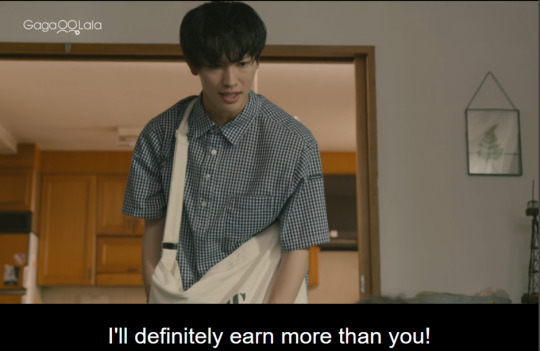
Y: 絶対あんたより稼げるようになってやる
Y: 漫画で!
Y: I'm definitely going to become someone who can earn more money than you!
Y: With manga!
I think difference between simply "earning more" and "becoming someone who can earn more" is important here - because it isn't about money - it's about competence. Yoh thinks his own worth is calculated in his ability to do things "well", be it in his work or at home. By that measure, Segasaki is worth everything and Yoh is sorely lacking, hence Yoh wants to "become" someone that is, in his mind, worth something. Because if he does not, then inevitably, Segasaki will one day come to disdain him.
There are so many times in this episode that Yoh hears things that should cement their relationship in his head, that he even recognizes as couple-like and accepts without protest - Man-san referring to Segasaki as Yoh's boyfriend, Segasaki losing his whole "man-of-a-few-words" thing and saying more to him in this episode than in any other, verbal confirmation that Yoh depending on him is something he welcomes etc. And yet, Yoh's fear filters all of that out and he hears only what sounds like his own self-judgement in Segasaki's voice. It's no wonder he lashes out at Segasaki like that, though really, who he's really attacking is himself. Afterall, sometimes when we hurt ourselves, we hurt the people who love us too, as we'll see in Ep 6.
(That was quite the arguement though, wasn't it!)
#my personal weatherman#taikan yohou#体感予報#MPW subtitle corrections#mytranslations#segasaki x yoh#segasaki definitely uses the wrong words sometimes#but it's not like he doesn't use the right ones either#until yoh acknowledges and believes in his own strengths#segasaki could promise to love yoh for all their natural lives and then some#and yoh would still fear that segasaki might hate him#sorry i just see so much discourse about how things could be solved if they just used words#but it's not about what is being said (or not)#it's about what is (and isn't) being heard
197 notes
·
View notes
Note
Hello!!! I love sm your hc/scenarios, they are SO GOOD!!!!
If it's not too much trouble, you could do an Obey Me scenario with the 7 brothers (separately obviously) with a fem (or gender neutral, if you prefer!) s/o who is pretty buff and what do they think about it?
I'm still kind of new to this game, so I don't really know about events or storyline😭😭 so do as you wish or which one would best fit in this situation!!

COMMENTS: Hi! Thank you! I'm glad you enjoy them so much 😊
I found your request interesting. I decided to write with a Fem Reader because a muscular body is seen differently if it is a man or a woman. As I don't have that type of body, it's difficult for me to think of a scenario, that's why I ended up doing headcanons.
I hope you and all enjoy it 💪
P.S.: You said you're new to the game. Welcome! I hope you enjoy your stay. 😈
CHARACTERS: Demon Brothers (Lucifer; Mammon; Leviathan; Satan; Asmodeus; Beelzebub & Belphegor)
TAGS: Fluff; Fem Reader; Comfort; Bullet Points
WORD COUNT: An average of 250 words per character.

CONTEXT: From the conversations in the game I assume that Beelzebub works out at home, so I also wrote thinking that MC would also work out at home and not in a gym.

Lucifer is very proud of you, BUT he still has his own pride as the man in the relationship.
Even with his brothers he likes to be the strongest, out of pride and to protect those he loves most. Things wouldn't be any different with you.
He doesn't want you to be weaker, he just wants to be stronger than you. He wants you to depend on Him and not vice versa, especially in matters of strength and power.
He will be happy to join you in your workout. In addition to spending more time with you, he also takes the opportunity to see how your workout is and set an even harder for himself without you knowing.
You'll never know how hard he works to remain the strongest in the family (which includes you). From him, you will only hear how proud he is of you, perhaps a similar pride to what he feels for Beel in a way.
That and provocative phrases to compete in some way to see that he is still the strong-... I mean to see who would win.
If anyone even has the audacity to insinuate that women are not beautiful with muscles, he will step in and use all his intimidation skills to humiliate the demon to the point of them being ashamed of open their mouths ever again.

Mammon's feelings are conflicted. He loves you and is proud of you, BUT if you are as strong or stronger than him it will be a huge blow to his pride.
He knows he's not that smart, so he only had his strength to brag about. If he doesn't even have that, then what can he contribute to the relationship?
At first he will need you to reassure him, telling him why you love him and that it's not because he's strong... I mean, not just because of that...
After that he will become more confident and maybe join you in some workouts.
One day, he might even consider the idea of helping you open a gym so you can both earn a lot of money. But then he will think of you as a personal trainer for some other demon and his jealousy will win and he will discard this idea completely.
If he becomes too comfortable with the idea of you being so strong, he will try to convince you to be his bodyguard. Mainly for the times when someone is after him to get their money back.
If someone insinuates that women are not beautiful with muscles, he will step in and incite a fight with the person who said it. And because it was about you he will use all his strength if necessary to shut up anyone who wants to try and say something like that again. He will make sure he wins all these fights. And if you help him, honestly, so much the better.

Levi never cared about being strong. But in your case, that's just another quality of yours for him to worship- I mean love. You are the knight in shining armor that he so admires.
Whenever you need it, he will tell you how wonderful you are and how incredible your body is. In a respectful way of course. The downside is that now he'll have something else to self-deprecate about.
He won't join you in the workout, sorry. But if you turn your workout into a game, maybe he'll consider it. But not in a PvP game, okay? He knows he can't win against you and even if he could he doesn't want to fight you.
He will ask you, without any shame, to open something that requires strength. And tell you how incredible you are right after.
If there is a couple that you both would like to cosplay and the man is the strong one, Levi will have absolutely no problem, and he may even be the one to suggest that you cosplay the characters but swapped. Or even change the genders of the characters. He will love doing couple cosplay with you no matter what.
If someone insinuates that women are not beautiful with muscles, he will step in like the simp- I mean stan he is, and start with that speech of an emotional fan defending the character he loves most without any hesitation. The demon who dared to say that will have to deal with his burning passion to the point of being like "O-okay, I’m sorry! Chill man...”

Satan always gave more importance to intelligence than strength. But if you have both, so much the better.
Your muscles don't bother him, at best they impress him. How could he not be impressed by your hard work? As long as you still have time to enjoy a book with him, he's just proud of you.
In general, he wouldn't treat you any differently. He would treat you the same no matter what you look like because what he loves is your inside, what you look like on the outside is just a beautiful cover of an amazing book, no matter the edition.
He wouldn't join you in the workout, sorry. Unless it's some kind of race after a cat or a competition with Lucifer to wipe the smug off his face, he'd rather sit and read a book.
However, there is a good chance that he will read books related to physical exercise to help you improve your workout. Or food books to recommend new recipes for dishes or drinks if this also helps you.
If anyone even has the audacity to insinuate that women are not beautiful with muscles, he will step in, probably in his demon form because he will be furious. No one talks bad about you in front of him! Whoever said that will be reminded why they should be afraid of the Avatar of Wrath.

Asmo will keep telling you how beautiful you are, like he always does and always will.
There are so many styles of clothes he can try on you that would look so good on your body type! You'll love it, you'll see!
He is already Princess Asmo and you will now be his knight in shining armor. This would probably describe your relationship pretty well.
He wouldn't join you in the workout, sorry. Your exercises are probably too hard and heavy for the type of body he prefers to have. Oh, but he LOVES watching you train. It's so hot!
He will definitely join you to eat. And if you start a diet or improve the one you already have, he will join you. If it's not a specific one for those who work out a lot.
He will also love taking photos with you and suggest that you take photos of you working out. They tend to be very trendy on Devilgram. And those photos from you? Everyone would love you even more! And Asmo would probably create some kind of album to feast his eyes on.
But he also has another, more protective side. From time to time he will ask if your exercises are not too demanding. You know, you shouldn't be so demanding on yourself, you can get hurt if you don't take it easy sometimes.
If someone insinuates that women are not beautiful with muscles, he will step in, with an aura that is both rare and intimidating. He will react to someone saying you are less than gorgeous the same way he reacts when someone insinuates the same about himself.

Beel and you are two beans in a pod, and that is awesome! One of the people he loves most can work out with him! What's there not to love about it?
There's a good chance you two will ask Lucifer to turn some spare room into an exercise room. And the same good chances of Lucifer authorizing it. This will become your special place and you would probably decorate it as such. Needless to say, Beel's brothers will start to get jealous.
Matching gym equipment and clothes!
Your walks in the park are jogs together. And there's a good chance this jog will end in a picnic in the park.
More jealousy from his brothers. Which will probably make all of them, except Lucifer and Belphie (Belphie is never jealous of Beel), suddenly have a huge desire to start working out too and join you. Beel will be extremely happy about this but they won't last much longer than a day. However, Beel will be happy that at least for one day he worked out with his family. And the others will be happy that he was happy. So, everyone ends up happy in the end and the jealousy ends up disappearing.
You will cook and make smoothies for both you and him. Otherwise he ends up eating everything before it's ready.
If someone says that women are not beautiful with muscles, he will step with that extremely rare angry aura, like when he's been hungry for too long and is capable of going on a rampage. In an imposing pose in front of the demon that insulted you to the point that they were covered by Beel's shadow.

It is undeniable to say that his twin brother is the brother that Belphie loves most. And now you have even more things in common with him! He absolutely loves you!
Needless to say, he won't be joining you for a workout. But he will support you in whatever way he can like he does with Beel.
He will be the person who tries to convince you the most to go down the wrong path. Not because he wants you to stop working out, but because he likes being lazy with you. He already does this normally but as you take time out of your day to work out, you can feel him being more pampered.
That or try to convince you to do something for him. Or instead of him. You are so much stronger and more athletic than him. It's so much easier for you to do household chores. Are you sure you can't do that little favor for him this time?
If someone insinuates that women are not beautiful with muscles, he will "nicely" give the demon an opportunity to apologize. If not, he'll just be one more nasty comment away from taking on his demon form and strangling the demon who dared to insult you.

If you dropped in here out of the blue and want to read more from me, you can find it in my pinned post: INDEX
#1000 followers#1K followers#1000 followers milestone#1K followers milestone#1000 followers celebration#1K followers celebration#Obey Me#obey me shall we date#obey me imagines#obey me one master to rule them all#obey me fluff#obey me x reader#obey me headcanons#obey me requests#requests#obey me Lucifer#obey me Lucifer x Reader#obey me Mammon#obey me Mammon x Reader#obey me Leviathan#obey me Leviathan x Reader#obey me Levi#obey me Levi x Reader#obey me Satan#obey me Satan x Reader#obey me Asmodeus#obey me Asmodeus x Reader#obey me Asmo#obey me Asmo x Reader#obey me Beelzebub
115 notes
·
View notes
Text
They're both wrong.
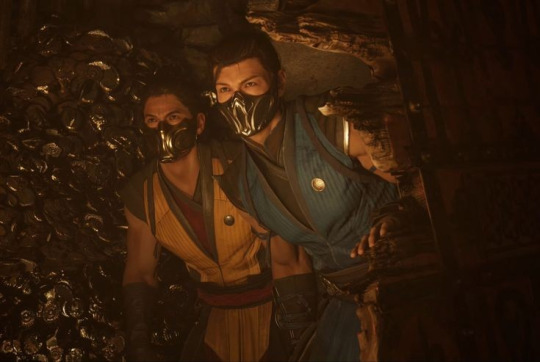
Hi. Recently, we often see different opinions about Kuai and Bi Han in this new relaunch (another one, my God). It's incredibly nice to see people who are really trying to look at what is happening from all sides, but guys - our attempts are in vain, because this game is a damn dummy. Some blame Bi Han, others blame Kuai, and everyone is right in their own way, but what if... THEY'RE BOTH WRONG.
To begin with, the game clearly marks its favorites and does not even try to pretend at least some intrigue and depth. Let's be honest, dear ones, we knew from the very beginning that Bi Han would be treated dirty. The only thing missing was the banner "I'm a villain, guys" at his breast. Let's leave aside how it breaks the character to hell and disappoints. Let's look at what is happening objectively.
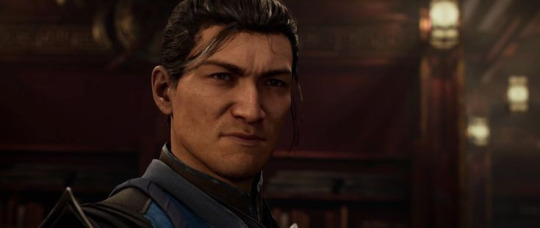
So, Bi Han is the head of his clan, who took this place after his father's death. According to Bi Han himself, he let their father die (somehow, and we probably won't know the details). What for? Because their father's vision limited the clan (we probably won't know the details either). Objectively, Bi Han had no need to somehow bring his father's death closer for the sake of power in the clan. Because - you know - Bi Han is the eldest son, he would have taken this place. Considering Kuai's words that there are enough people loyal to Bi Han in the clan, this means that it was not about power as such, but something else. Bi Han let his father die not for the sake of power for himself personally, but for the sake of the greatness of the clan (whatever that means, the game does not give explanations). This is not a selfish motive. At least, not in the direct understanding of this concept.
It seems that Bi Han is not interested in taking over the world completely. He says that he needs a part of the Earthrealm and nothing more. He... wants to build a state? This is a contradictory goal, but it has a place to be (and also our joke about him wanting to restore the Qing Empire turned out to be prophetic; we need to stop joking about it). From this we can draw a logical conclusion that it is not in his interests to betray the Earthrealm, to condone its destruction or subjugation to someone else. Because it literally contradicts his goals.
The next thing that fans hate him for is that it is he, Bi Han, who leaves his brother the his scar. We've seen claims that he tried to kill Kuai and... it's quite possible that he did. Emotions, rage push him forward, to attack. Bi Han is constantly angry, but especially in this scene. And if you review this scene, you will clearly see that Bi Han waited a VERY long time before Kuai noticed that the knife was in his other hand. This is really a decent slowdown, and Bi Han had the opportunity to kill his brother at the same moment. But he doesn't. His attack is an impulse, not a cold-blooded desire to kill Kuai.
Another reason to hate Bi Han is Smoke. More precisely, the fact that Bi Han - that's terrible! (sarcasm) - does not accept him as a brother, because Tomas is not his blood brother. Bi Han says that Tomas is not Lin Kuei by blood, and this moment raises questions. A clan is a social association that is based on blood ties. This is usually one or more families united by kinship of varying degrees. In the old chronology, it was never exactly said whether Lin Kuei was a clan, a united kinship. More often it seemed that these were conditional ties, more idealogical than blood ties. But here Bi Han puts a lot of emphasis on blood ties. So does this mean that Lin Kuei is still related to each other? This can also be regarded as the fact that Bi Han says that Tomas is not part of their family, and not the clan as a whole, and this is the case. Even people treat blood brothers and sisters differently, it all depends on the upbringing and the situation in the family. We don't know anything about the context, we don't know about the past, about the relationships of these people. Frankly speaking, they do not communicate with each other like real living people who, albeit conditionally, are part of the same family. All their dialogs can be replaced with:
Bi Han: the exposition.
Kuai: the exposition.
Tomas: the exposition.
Bi Han: exposition and an unexpected plot twist.
Kuai: the exposition. Some important phrase.
Tomas: another exposition. Write me a check and I'll go to in a better movie.
Bi Han and Kuai: we will also go to in a better movie, but first here's another exposition.
The only time one could truly believe that they were somehow connected to each other was when Bi Han asked if they were both unharmed. He just fought Ermak, a creature with thousands of souls, but it is he who asks Kuai and Tomas if they are okay. Not the other way around.
Another problem associated with this scene is that many people did not seem to be watching it with their eyes. We literally had to point out to our friends at this point. Damn stone. Reconsider, come on. Bi Han doesn't kick him, doesn't throw him down. He just ends up too abruptly on the edge of the wall and a piece of stone breaks down by accident. Bi Han doesn't want to kill Tomas. Bi Han doesn't want to kill Harumi either, for that matter. In that dialogue, he says that the family can be a means in this war. He doesn't say "I will kill your wife", he just said that he might consider influencing Kuai through something/someone else. Take Harumi hostage or influence her to influence her husband's decisions. Maybe just find a way to negotiate with her, because with Harumi, Bi Han doesn't have a family drama that seems to have been accumulating for years. People who accuse Bi Khan of something he didn't actually do, be ashamed, because this is slander.
Bi Han is still the antagonist. More precisely, he could be him, but his betrayal does not make any sense at all, either emotionally or in plot terms. He doesn't do anything else after it and disappears from the plot. He might as well have just been injured by Shang Tsung or by Quan Chi, and recovered in the hospital behind the scenes.
The problem is that the game doesn't want players to somehow empathize with Bi Han or even support his goals. And his goals (no matter how illusory they may be) have a place to be. He is ready to take extreme measures, radical decisions, but in fact he has not done any of this yet. The studio did not make him either a positive hero, a cool antagonist, an inspiring villain, or a neutral character with his own motives. He's just a piece of evil cardboard, against which Kuai should look as good as possible.
Is Bi Han right? We don't know. The game does not give any context and declares that he wants power for the sake of power, which is always as negative as possible, because the desire for power does not lead to good. Is he right to let his father die (whatever that means)? No. Without context, the answer is unequivocally "no". Is it cruel of him to be cold towards the orphan Tomas? Cruelly. But there is a place to be. Again, we lack at least some context. The game just says - hey guys, Bi Han is a villain now, condemn him for his villainies that we didn't even really come up with. Excellent solution, NRS writers, just excellent.
Summing up - Bi Han:
1) ambitious (which is not explained by anything)
2) cold with others
3) somehow involved in the death of his father
4) puts his clan above everything else and even above blood ties (although he himself refers to the importance of blood kinship and .. IT DOESN'T MAKE SENSE AT ALL)
In a number of dialogues, Bi Han is inconsistent, but let's remember that he is a person who will not tell the enemy the truth about his relationship with someone. So don't take at face value everything he says to other characters in the intro. He is still angry, but he still wants the brothers (Kuai for sure) to be on his side, although on his rules.
And now let's approach the situation from the other side. Kuai and Tomas. And we will immediately abandon Tomas, because - you know - he is not even a character in this farce. He's just a weak-willed appendage of Kuai, completely devoid of personality, and the script is completely to blame for this. Tomas had at least some problematic and self conflict in the old chronology, he literally lived with a demon in his head. Unfortunately, now he's just a dear friend of one of the main characters. He deserved more. Let's remember the wasted potential with a kind word. And let's move on.
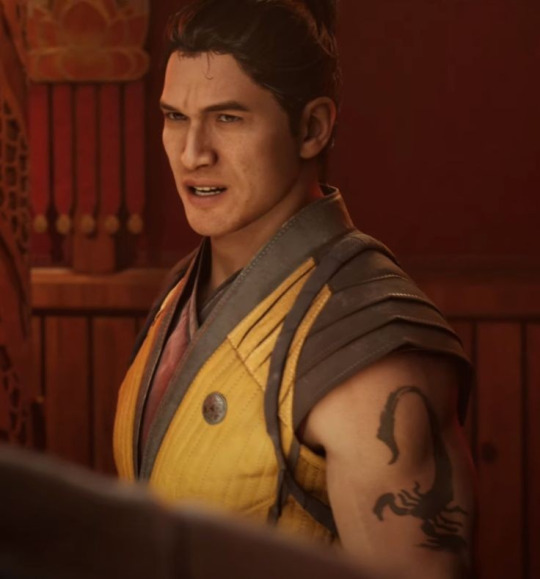
So, Kuai Liang. Let's not touch on the topic anymore that this is not really the Kuai we knew; that the studio also took away all his personality. This has been said many times. Let's look at it within the framework of this particular plot. He is the second/youngest son of Grandmaster Lin Kuei clan, and he probably has less chance of to rule the clan. From his official biography, it can be said that he was attached to his father because he grieved after his death. Again - we don't know anything about their relationship. Of course, the child's love for the parent is unconditional (but for some reason this does not apply to Bi Han), and it can be understood that Kuai is devastated by the death of his father. But there is no context here either. Were they really close? Or was Kuai's father a kind of idol, as for many children with rather cold parents? We don't know, because the game doesn't say anything else, except that the previous Grandmaster took the wounded orphan and raised him in a place where Tomas could see the people who killed his family every day. It's a very merciful decision, man, but let's not talk about it now.
Kuai follows his father's vision because he grew up thinking it was the right thing to do. And it makes sense. It is right for Kuai to guard the Earthrealm with the methods that his father instilled in him (perhaps because we again have no idea what was between them). He is quite young, with a hot heart and a hot head, so with all his sanity, feelings will often prevail in him. And this is normal for a living person. He is not as desperate for action as Bi Han, and is more passive at such moments, which can be explained both by the family situation and the nature of his character. Again - we don't have the context to judge for sure. And although some of his statements seem indifferent towards his brother, the game clearly does not imply that Kuai is a bad person or a bad brother. Although, of course, it is not perfect.
Understand correctly. This whole family - Bi Han, Kuai Liang and Tomas - is problematic. If you listen to some of their dialogues, look at their general behavior and logically understand what is happening, then a picture emerges when an unclear family problem has been growing for years, but all three have too little habit of talking about their feelings and trying to solve the problem with words, not a fight. But at the same time, the plot is desperately trying to make Kuai a positive character. And the most revealing scene here is Kuai's attack on his brother in the tomb. Let's take it in order, because a lot of people have problems with this scene too.
1) they are captured
2) Shang Tsung talks about his plan, trying to lure Lin Kuei to his side (and thus the heroes get information)
3) Bi Han silently makes it clear that he seems to agree to the sorcerer's terms (we remind them that they are still in captivity)
4) Bi Han says he let his father die
5) Kuai attacks and in a fit of rage tries to kill his brother, he does not succeed (and it is the intervention of another soldier that does not allow Kuai to make a mistake)
6) Kuai escapes
This scene is stupid and meaningless from beginning to end. Bi Han, whose goals are to control a part of the Earthrealm should least of all trust Shang Tsung. On the other hand, if he says no, nothing will stop the soldiers from cutting the throats of both brothers right here. The army of living statues is not some incredible tool at all, they burn and melt very well (as we have already seen). Why did Bi Han agree to this seriously? But what follows is a moment that is just confusing. Bi Han says that he let their father die (it is unclear what exactly he means), and Kuai attacks him without the slightest hesitation and delay with such fury that without outside interference he could have killed Bi Han. Yes, he is emotional, he is furious, he is in grief. To know that your own brother did this is just awful. But before that, Kuai is shown to be a calm and sane person who will think first and then do something. If he had remained the same as he was shown to us, he probably would have really doubted his brother's words. You know, if our brother had said that he was to blame for the death of our mother (as a person whose mother died, we can say so), we would have first thought if he had gone mad. Because in family relationships it is normal to believe in the best in your relatives. Did Kuai have doubts, suspicions? No, the game didn't show that. Again, we are not given any context. The plot wants us to just believe that Kuai is right to appeal to our conscience, because parricide is always bad (tell that to Tyrion Lannister, yes).
Kuai can be understood in his anger. Even if it happened that he accidentally killed his brother in a fit of rage, he would regret it. The game tries to pretend that he is a good person and that he really cares about his brother, even if he is absolutely crazy, but the plot doesn't even try. Kuai takes Bi Han out of the fortress so that he does not help Shang Tsung. This is exactly what Kuai himself says directly. He's probably a good brother (???) *bewilderment*.
Kuai is actually trying to be a good person. He is trying to restrain Bi Han's ardor, to support Tomas. He doesn't really want to fight, but he doesn't run away from battle either. The difference is how he solves his problems. Knowing that a paramilitary clan remains under the command of Bi Han, which may pose a threat, Kuai escapes. Again, we don't have the context to understand whether this decision is logical or infantile. We mean that he is the son of the previous Grandmaster who defeated the current Grandmaster in battle. He definitely has at least some weight in the clan. He could have just grabbed his brother and hammered some common sense into him, because - you know - lives depend on it. But the plot literally does not allow Kuai to act logically.
He's not a scoundrel. Not a traitor. He tries to follow what he thinks is right. He is the same person with his own goals as Bi Han. But the difference is that the plot exposes one of them as a villain, and the other as a pure and innocent hero. And such a sharp separation, which does not allow the characters to be interesting and lively, is frankly annoying.
By the way, Kuai is also inconsistent in the introduction. He clearly doesn't want anyone else to harm Bi Han, but he doesn't tell him about it. And it makes sense, because there's still this damn family drama between them that makes them both angry.
In the end, they are both wrong. They're both terribly scripted characters that the writers play like dolls. And it's not the fault of the characters, it's the fault of an absolutely immature plot. Don't blame them both, understand that this game just can't handle the disclosure of heroes and uses manipulative elements to hang labels.
We understand the frustration and the desire to find meaning where there is none. But, as they say in our country - do not stretched an owl on the globe (no need far-fetched facts).
This is a terribly manipulative immature plot that attracts attention only at the expense of the fanservice. Don't blame the characters, don't pour shit on them. Remember that they are hostages of the script.
The perplexed Kenshi, as the embodiment of our reaction to everything that is happening.
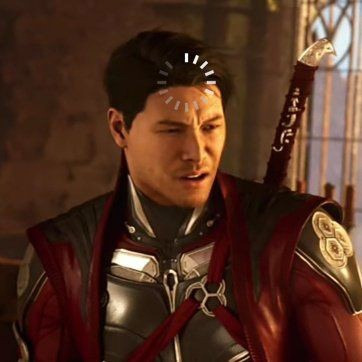
#bi han#kuai liang#tomas vrbada#mk#mortal kombat#mk1#sub zero#lin kuei#smoke#mk scorpion#scorpion#bi-han#mortal kombat fandom
154 notes
·
View notes
Text
When “Death to the Author!” poses as “Death of the Author”
The literary theory called "Death of the Author" was developed by French philosopher Roland Barthes in his essay “The Death of the Author” in 1967. The theory declares that the author's intention and biography are not relevant to the interpretation of the text, rather, its meaning is determined by the interpretation of the given reader. This is understood as meaning that an author’s view about their own work is no more or less valid than the interpretations of any given reader.

However, most often than doesn't, what some calls "Death of the Author" is, in truth, “Death to the Author!” which we shall define as a given reader or viewer's, a fan's desire to legitimately re-imagine and retell the story told by the author. The “Death to the Author!” theory argues that the author has no more or less say in what is part of their story than readers or viewers, that the elements they invented and inserted into the story are must be treated just as integral parts of it as the work of the author. What message and lesson, philosophy and set of values the author intended to communicate through their work of fiction is treated as relevant only to the author, since these things are changing depending on which story element is replaced, altered or "completed" by any given reader or viewer, based on their own ideas, beliefs, views, opinions and values. In its most extreme, the events, characters, arcs and fictional universe of the story are all treated as a reality existing independently from the author, and it's asserted that the author's narrative is only one take on that reality.
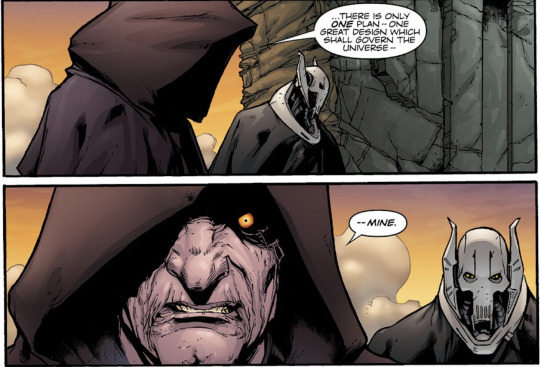
"Death to the Author!" is rarely articulated and in most cases, it's not even conscious, but it's relatively easy to spot it in a fan's toolkit. The most prominent sign of “Death to the Author!” is the fan asserting information about characters’ background, motivations, wants, likes and dislikes, mental and emotional processes, organizations’ history and activity and so on that are simply cannot be derived from, in its most extreme, outright in conflict with the source material itself. And sometimes, when the fact that these alleged informations cannot be located in the source material is revealed, the fan might try to assert that fans have a moral, ethical responsibility to “complete” and to "correct" the work of fiction with said fan-invented content, so it will be authentic, since its absence from the story is simply the result of the author’s moral and ethical failure and ignorance.
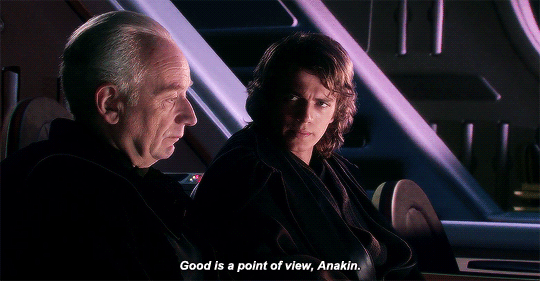
Proponents of “Death to the Author!” often seek to legitimize their theory by claiming, it's deconstructionism. Deconstructionism was created by French philosopher Jacques Derrida. As a literary theory, deconstruction is the close, detailed analysis of texts, so one can find underlying presuppositions that structures of meaning rely on, trying to find clues that give away alternate or contradictory meanings. For example, if a reader or viewer can see how a literary text or a movie intentionally correlates light with "goodness" and darkness with "evil", a reader might begin to question the truth of these correlations. If darkness represents evil in Star Wars, how come that the storm troopers are all white, just like Princess Leia? How come that Luke Skywalker wears black? A deconstructionist recognizes how the text or movie plays with the assumptions readers and viewers make based on connotations of the words and the images they create, enhancing the tension in the story, and undermining the possibility of the text or movie creating only one meaning. Fan "deconstruction" is related to deconstruction, but it's different: it means, fans are looking at tropes and asking, "how this trope would play out in the real life?" However, proponents of “Death to the Author!” are not deconstructionists, they only use the word as a cop-out.

For them, “deconstruction” is to take parts of the story out of context, filling them up with any meaning that the given reader or viewer wishes them to mean, based on their beliefs, ideas, views and opinions, e.g. "X is a politician. I am convinced that politicians are corrupt. Therefore, X is corrupt, even though the story doesn't explicitly shows it," then putting the modified elements back into the story and referring to them as evidence that would support the “deconstructionist’s” claim, "X is a corrupt character who should be in jail." The “deconstructionist” would argue, all they did was asking the question, “how this story element would play out in the real life” or they were just "reading between the lines" or "found the subtext." It shouldn’t be hard to see that this wasn’t what happened. The only thing that "deconstructionists" and deconstructionists may have in common is the conviction that it's not possible for a movie or a text to create only one meaning with the set of semantic signs they operate with, however, “Death to the Author!” tries to use this notion to escape the burden of proof: if there is no one absolute meaning of a text or a movie, then one can assign to them any meaning they want. This is, however, not what deconstruction means, and those who say “Death to the Author!” are eventually starting to talk about their right to believe and say what they wish to believe and say and can end up decrying the author's position as "privileged" or "elitist" "oppressive" and so on and call for the "democratization" of the fandom or the work of fiction itself - this, however, a call to erase the work of fiction and to metaphorically kill - and rob - the author.
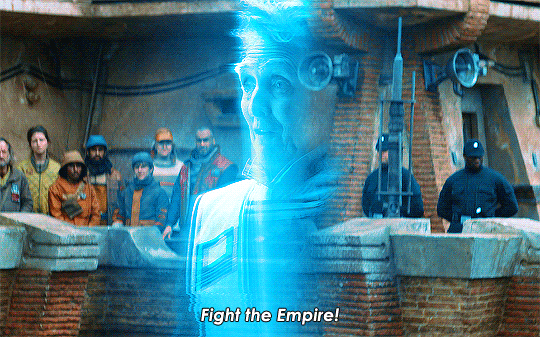

Although "Death of the Author" wishes to make authors' intentions and biography irrelevant when it comes to interpretations of their works, there is nothing in "Death of the Author" that would prevent the respectful preservation of informations about authors' intentions and biography and acknowledgment of the meaning they hoped to convey to their readers or audiences. This is the preservation of the knowledge and history of the past, communicated through arts, and it's necessary for the normal functioning of any culture and society. By contrast, "Death to the Author!" is an assault on the author and an assault on their works. In truth, it's the unwillingness to engage in the exchange of views, opinions and ideas, and to allow our own views, opinions and ideas to be challenged by others. This makes "Death to the Author!" a symptom of a dangerous attitude becoming more and more common in communities and this makes it a version of book burning: it's an attempt to erase artistic content that is not in line with a given fan’s system of likes and dislikes, ideology, views, opinions, beliefs, values, and it's the demand for the freedom to first spread and eventually to impose an "interpretation" of the content that does. This time, the erasure is not physical, since the loathed works are still there, physically, but they are robbed from their voice, and it's no longer able to reach its audience.
#death of the author#death to the author#fandom problems#censorship#literature#George lucas#star wars#fandom#fandom culture
110 notes
·
View notes
Note
hallo, hi...sorry for probably asking something small. but i see you explain things very well and if its okay i wanna have a person explain this to me.
what's a transfem and transmac? i don't quite understand what those terms are. i think i see people use them in context different from just "trans man" or "trans woman"...and looking online i still don't really understand it.
if i am being a bother, please let me know!
@re-ikrmso
well ! the first thing to understand is that these terms will ultimately mean different things for different people !
labels are for people, people aren't meant to conform to labels. so ultimately people will have their own ideas about what different labels mean to them on a personal level.
it's kind of like how there really Isn't one firm definition that separates bisexual from pansexual, the distinction is largely personal and highly dependent on the context of an individual's life. their experiences, what communities they grew up and/or found themselves in, etc !
which ultimately makes it very difficult to give a definitive definition of labels like this that won't risk alienating people, or that other people won't simply disagree with.
THAT SAID.
to my understanding, "trans masc" as a term simply means anyone who is trans in a masculine way, while "trans fem" as a term means anyone who is trans in a feminine way.
for example:
someone who is a Trans Man is most likely someone who was assigned female at birth who then identified as a man (if you'll excuse the outdated terminology for convenience).
but trans Masc may include a variety of other trans identities !
a nonbinary person who transitions or presents in a masculine way may consider themselves trans masc, or at least consider them relevant in discussions about trans masc people, because they have similar experiences (such at with testosterone, bottom/top surgery, how they're treated because of their presentation, etc).
and this Can be true whether this nonbinary person considers themselves Aligned (meaning they are nonbinary in a masc direction) or Unaligned (meaning agender or completely separated from the gender binary). it's ultimately up to personal preference.
or an intersex person may be assigned male at birth And Be Trans Masc, may still transition (medically or socially) into a masc presentation.
they're also convenient terms for people who play further with gender. genderqueer people, genderfluid people, bigender people, etc.
because ! for instance. I am a trans masc person. I was assigned female at birth and I have identified myself masculinely. I would like to take testosterone and go through the social transition into a masculine person.
I also consider myself a trans fem person ! I would like to present femininely as well as masculinely, and importantly I wish to continue doing so after I HAVE medically and socially transitioned. after I've had my name changed, after I've had my legal sex changed, after my body and voice has changed.
there will be times where I will be visibly identifiable as a trans body presenting femininely, And I Like That. I won't just be presenting femininely as a man, I want to be both a feminine and masculine person.
and what this means for me is that I will share experiences with both trans masc And trans fem people, especially socially (and especially where I live, in the deep south).
but there very much so Does need to be a distinction between me (an afab person who is trans in both a masculine and feminine way) and a trans woman (an amab person who is a woman) (again, apologies for the outdated terminology).
and in that sense ! trans fem is a good way to get across the fact that I share Experiences with trans women, but am not one. in much the same way that amab nonbinary people can say the same.
so in other words ! trans fem and trans masc are umbrella terms that loosely connect multiple different sorts of people with similar lived experiences and needs. which is a convenient way of speaking About said needs and issues that may affect all sorts of these people in as efficient a way as possible.
instead of Specifying trans women and a list of other identities that may share things in common with them (a list that will never encompass every kind of person who may), you can shorten it to one more generalized term.
the Drawback of this is that not everybody sees the term that way. some people see trans fem and trans masc as identities in and of themselves that trans women and trans men aren't a part of. some people are people who Do share lived experiences with either trans men or trans women but don't consider themselves either trans fem or trans masc.
and that's like. Okay Actually. it's just expected that for any term that exists in queer spaces there will be people who don't like it or don't personally identify with it or just have a different experience with it.
but ultimately I do find it convenient to use and I choose to do so.
#discourse#not really but that's my tag for talking about things like this fjklsajklafds#queer unity#trans unity#trans fem#trans masc
78 notes
·
View notes
Note
can you explain that "french is evolving into cooler french" thing? im a linguistics student and i took a look at the article but it went over my head. i'm going to send it to my professor but i'm curious if you have anything to say about it 🖤🩶🤍
Okay so the first thing to know is that spoken French and written French are two pretty different languages! Not only is written French written in a very different way from which it is pronounced (with the orthography more accurately reflecting 15th century Medieval French), but spoken French even has a different grammar on some key points!
This grammar stuff actually means that spoken French is better seen under a completely different angle. While "subject" pronouns are written as full separate words, they are now, especially in spoken French, "clitics", parasites of the verb that can only occur just before it and act as a second conjugation. You can't split them up with an adverb or anything, like "you actually can" do in English.
Several kinds of clitics add up in front of the verb in a specific order, with the pronunciation of each changing depending on the surrounding context. For instance, where written French has "ils ont" (they have) and "ils vont" (they go), spoken French has "iz õ" and "i võ", with the pronoun mutating depending on the context. These clitics also appear to be more mandatory, as one would expect of conjugations. While written French could have "Jean a" (John has), it is more natural in spoken French to say "Jã il a" (John he has).
(Yes, writing French in a phonetic way looks cursed, but simultaneously much cooler than how written French usually looks)
While this all exists on a spectrum, spoken French shows more and more traits of what is called "polysynthetic languages", a relatively small category of languages where many words are glued on the verb on a specific order, forming the core of the phrase. This blurs the distinction between what is and isn't a word, a distinction reinforced by the fact spoken French doesn't have an immediate written form to decide on where word boundaries lie.
84 notes
·
View notes
Text
"You're Just Sitting On The Train" - Double MV Analysis
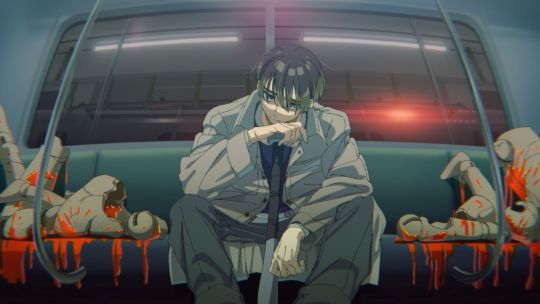
There's a conversation between the two main character's in a podcast I love called Red Valley which reminds me of the imagery in Double.
"You know when you're on a train, and it's held up, and you're just stuck in the middle of a field while they get the leaves off the line or whatever, and you're going to be hopelessly late, there might be awful consequences to get stressed about but... there's literally nothing you can do about it. It's not your fault. Hopefully you've got a book or something. You're just sitting on the train."
The conversation in context with the scene is about being able to put your problems and stresses, like being late for work, on someone else's shoulders. Let them take responsibility for what's going on so you can feel some relief. It got me thinking about Mikoto and Orekoto (who I'm just going to call John thanks to Neoplasm) and I want to talk about what I think the meaning of it is!!
Trains have many, many different meanings - like almost a ridiculous amount of different interpretations can be made - but I think the meanings that are the most important while talking about Mikoto are trains representing the passage of time, destiny and loneliness.
Loneliness:
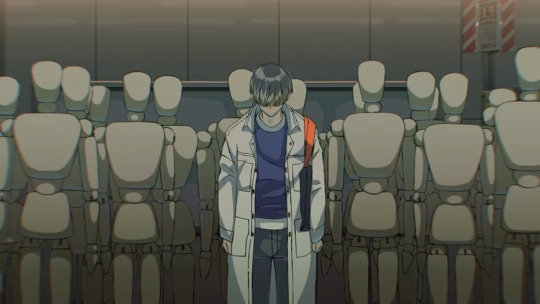
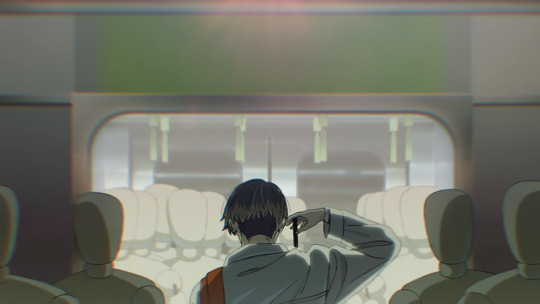
While on a train, or waiting for one, you are surrounded by people. However as shown here, most keep their head down and don't speak unless spoken too. It gives a sense of loneliness, you are surrounded by people yet completely alone.
I think this could apply to Mikoto's situation and was possibly a stress factor for him. It is implied from his T1 interrogation questions that Mikoto was popular enough, knowing a lot of people either now or back in high school, but he doesn't seem to open up to any of them. He's alone in the big city with nobody to talk to. He lies to his mother that everything's okay in their phone call and bottles up his stress. Because of this he is dependant on John to function : "But if you persist, I guess it's my job to keep things on an even keel."
The Passage of Time:
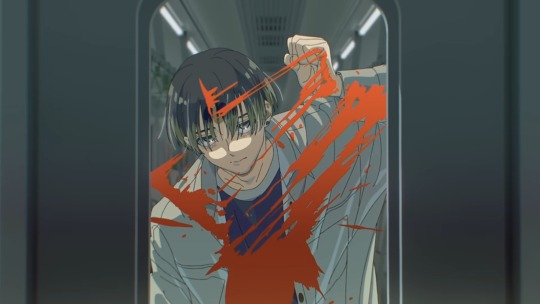

This shot showcases how long the train actually is, it flies through each carriage insanely fast, blurring slightly from the speed alone.
It's been extremely clear since T1 that Mikoto suffers heavily from dissociative amnesia, something that is a very common symptom of DID, and I think the fact this shot blurs could be representing that.
Trains representing time and how humans view the passage of time is probably one of the most popular ways they appear, we tend to think of time as one thing that moves forward constantly in a straight line, similar to an uninterrupted train on a train track, but for Mikoto (and John) time is blurry, hazy. It may seem like things move too fast to keep track of (pun not intended) or individuals with DID can sometimes describe it as feeling like you're missing hours, fronting in a place or room you know you weren't in before and being unaware of the events that led up to you getting to this point.
This feeling of missing hours is relevant to this specific scene as after the camera moves through the train the first person we see is Mikoto - not John, who was in the doorway.
Destiny:
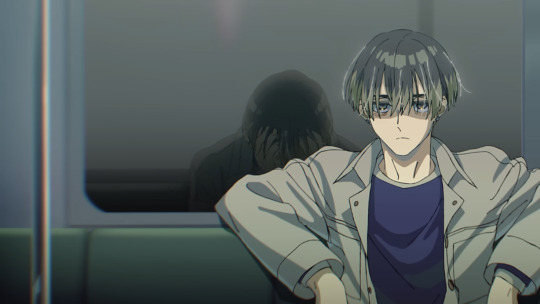
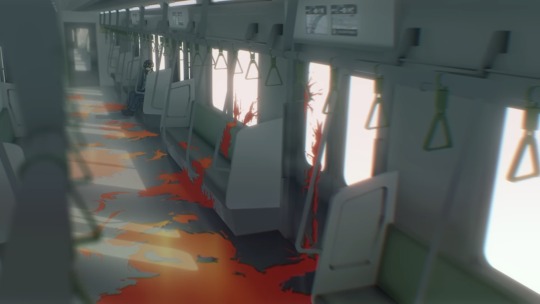
Trains are always headed to a specific location so they can also be associated with life's journey, or in other words, fate and destiny.
Both Mikoto and John are shown as the passengers on their train, not the conductor. They are not in control over life's events, just sitting on the train and this is extremely stressing - especially for Mikoto. John says things like : "another day with that hardly barely there of a smile // You're going to break // You're overdoing it, you're already broken". Mikoto seems to find it hard to deal with life's events, aka the train ride, and perhaps feels like the end destination is unattainable at times of stress.
This point is stressed further imo by the fact that we can't see outside. The windows of the train are either white or black for the majority of the MV, sometimes light or 1 image makes itself known but never a full image of what's actually outside.
Bonus: The Train's Maps!
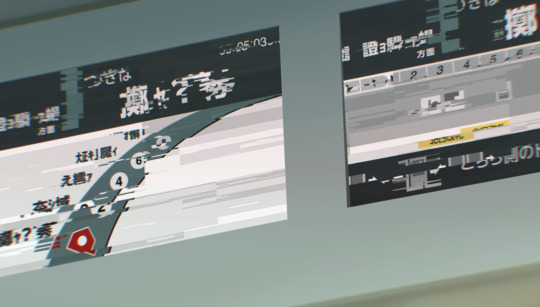
The map's of the train are shown glitched out, also possibly hinting to the feeling of the train's final destination being unattainable, or could also be referencing hazy memories, but I think this specific detail is about John.
We see the maps glitching out when John sings the lyric : "I don't even know the reason why I'm here." [Future Mars I now know this was Mikoto singing but um.. my overall point still stands.] I think the maps glitching could represent the feeling of the loss of purpose.
John was 'born' in order to protect Mikoto, to help carry the burden of whatever is stressing him so much, yet instead of helping Mikoto he ended up being scared of him ("hey, now I saved you right? So why in the hell are you crying?") and it was John's actions that landed them in Milgram - an environment that Mikoto finds extremely stressing, to the point of there being a chance he goes dormant in T3.
Trains are created to arrive at a certain destination, so a train with no idea where it's going (glitchy maps) has lost its purpose.
Despite being an alter 'born' to protect, John has accidently caused Mikoto more harm when he tries, so he questions his role in the system.
Edit: Journey into the Subconscious
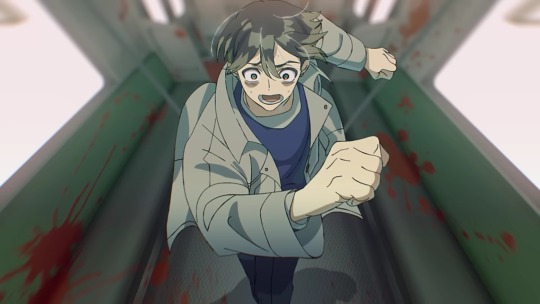
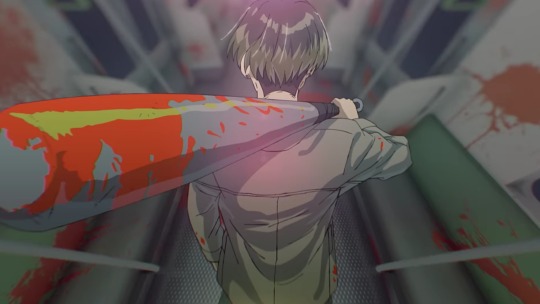
After staring at the MV a couple more times I think there's one more train theme I forgot to mention that fits here too, which is that trains can sometimes represent a journey into the mind.
I think there's a chance that the train could represent the system as a whole, or more specifically headspace. The only people on the train are John and Mikoto and the fact we never see what's outside gives a sort of surreal, dream like atmosphere, almost as if this was happening in an environment with no psychical appearance.
The lyrics sung in Double seem to be more directed at Mikoto than the actual audience, and from the last line "I'm so sorry" we can deduce that this song is something of an apology and explanation of John's actions that he wants Mikoto to hear.
#im not rlly 100% certain on any of these points but i wanted to throw them out here to see what others think#also just wanted to write atleast 1 thing on Double because god damn it was SO COOL#also i am in no way an expert on DID - any info here is based on my own research so if there are any inaccuracies pls lmk!!#also yes thats another podcast referance in my milgram analysis. i like sprinkling them in when i find the excuse to talk about them#also sorry for calling orekoto john but im sticking with it cuz that reminds me of john doe from the malevolent podcast#and he is my blorbo#milgram#mikoto kayano#red valley pod
106 notes
·
View notes
Text
Endemic Non-Lingual Tinies
Imagine a world where tinies never evolved the capacity for language (Mostly due to the fact that larger civilizations did not survive natural selection)
I posted about this idea before, but let me be more specific this time:
These tinies cannot speak, cannot read or write, and they cannot be taught language.
Their brains completely lack the capacity to convey complex ideas.
The most 'language' they can possibly learn is about twelve words.
And that's just because they memorized the sounds and meaning in the exact same way a dog would.
However... just because they are not able to convey complex thoughts, doesn't mean they don't have them.
Their thoughts aren't articulated as words (like humans do). Instead, they think in images, concepts, and emotions. And their voices are... just little chirping sounds.
Imagine seeing a pack of two or three tinies hiding under a picnic table, chirping and squeaking at each other. They are communicating, but only in the simplest possible terms:
'Anger', 'Confusion?', 'Assertion', 'Anger', 'Apology', 'Submission', 'Acceptance', 'Condescension', 'Exasperation', 'Challenge?', 'Dismissal...', *Scampering Off*, *whimper*
It's like hearing crows argue outside your window. There is clearly a conversation happening. But it's all conveyed through tone, body language, pitch and context.
But to a human? It's just a bunch of tiny noises that sound almost identical.
That's just how things are with tinies! They're clearly intelligent. Most of them are able to craft weapons, tools and clothes. Some have even been observed making mechanical devices!
For a moment, one could almost forget how different their minds are. Watching them work, they seem just like us...
And then you notice those tiny engineers keep a sort of 'Master Pebble' (which they carry everywhere, cradling it protectively) Because they do not have any other way to standardize their measurements within or between packs.
...Maybe not just like us.
And of course, how much you see tinies at all depends on the area, its wildlife, fauna, and ~general vibe~
If tinies feel particularly safe somewhere, they will mingle out in the open (but always close to a potential escape route).
You can wave at them of course! In a hostile area, they will flee at any acknowledgment. In a friendlier or safer place? They will wave back! They aren't 100% sure what the gesture means, but it keeps the humans happy and most will immediately leave them alone after getting a wave back, so most tinies keep doing it.
[Side note:
Mimicry has become most tinies' default solution to a seemingly friendly human gesturing at them. Don't believe me? Lock eyes with a tiny and wiggle your body a couple times. They'll be confused as hell, but goddamn it they will wiggle]
It's extremely rare for a tiny to approach a human, but the experience is absolutely magical. Maybe they're hoping you'll drop some crumbs from the snack you are eating. Perhaps they are curious about you, and perch nearby to watch in amazement as you lift an entire apple! If you've earned their trust, they may even beckon you to help them when there is an emergency or accident.
All in all, tinies are a beautiful little enigma. Their intelligence, willpower and emotions are almost a mirror of our own. But their instincts, communication and relationships are as wild as the animals that surround them.
(I wanted to revisit my idea about tinies that never evolved the capacity for language. Because it's by far my most popular post, and yet somehow, the core vibe never really got across. probably because of the specific fearplay scenario used).
34 notes
·
View notes
Note
hello, i was just wondering if you had any advice for writing vignettes or episodic stories. thank you.
Vignettes and Episodic Stories
I don't have any tips, per se, but hopefully explaining a little bit about what they are will help you better understand how to write them.
The term "vignette" has two different meanings depending on what you're writing. In fan-fiction, a "vignette" is a type of standalone story synonymous with a snippet or ficlet. Vignettes in fan-fiction are typically 1k words or fewer and usually made up of a single scene.
In original fiction, "vignette" can be a type of standalone story, but they usually appear as part of a themed collection of vignettes. More often, the term "vignette" in original fiction refers to a literary device where further descriptive context is provided to a character, place, or event.
As standalone stories, vignettes do not conform to traditional story structure. Since they focus on a moment in time, they do not show the passage of time and typically do not have a story arc or a beginning, middle, and end. And, as is the case with vignettes as literary devices, they are heavily descriptive and meant to appeal to the reader's senses.
Episodic stories are a bigger story that are broken into smaller, self-contained stories connected by an overarching narrative or unifying theme. The best way to think of episodic stories is to think of a TV show. Every episode tells its own complete story, but the characters and events are united by a broader narrative. For example, you can watch an episode of The X-Files where Mulder and Scully try to solve a strange missing person case--and that episode will have its own conflict and its own beginning, middle, and end--but the episode is connected to the broader narrative of two FBI agents who are tasked with investigating strange occurrences. And, within that broader narrative, the specific seasonal and series arcs.
Happy writing!
•••••••••••••••••••••••••••••••••
I’ve been writing seriously for over 30 years and love to share what I’ve learned. Have a writing question? My inbox is always open!
LEARN MORE about WQA
SEE MY ask policies
VISIT MY Master List of Top Posts
COFFEE & FEEDBACK COMMISSIONS ko-fi.com/wqa
39 notes
·
View notes